#character arc to be like because obviously she would still be functioning within a story
Explore tagged Tumblr posts
Text
ive heard that prime earth brought willis back to life at some point which like i gotta be honest if it was up to me and *i* was in charge of jason I'd have been tempted too, bc the note in the file that jason finds just says Willis is suspected to have been killed by twoface--i mean the word suspected is there. and i tend to have thoughts about how jason narrative-izes willis in my headcanon, so i think that has potential even though i doubt the way dc did it actually did anything interesting with it lol.
but ultimately i actually think it would be more interesting as an exploration of Jason's character, and a way to develop him, to resurrect sheila who had indeed been very dead and force jason to deal with the fact that she, and the choices she made, was a major player in his death. i want to force jason to reckon with that, that sheila never intended for his death to be anything more than an unfortunate blip in her own story; i want to force him to look at the senselessness and be unable to make sense of it.
jus think it would be neat <3
im really such a big "jason does not touch cigarettes after his resurrection" truther bc i love the contrast btwn surrounding himself with symbols and reminders of his death, of the way he's purposely this big gaping open wound, but only in a way that fits the narrative he's trying to build for himself. he believes there's no part of that personal tragedy he hasn't or won't face, but he hasn't ever allowed himself to think about sheila haywood. if you asked him why he doesn't smoke he'd say something dismissive about how he already died inhaling smoke once, he's not in a hurry to do it a second time, and then he'd casually be hanging around in buildings he rigged to explode, no sweat. and he doesn't have any problem with the scent of cigarette smoke either, and fuck you for asking, he's only nauseous because he ate something off this morning, finish your cig he's just gotta get some air.
#text#jason todd#sheila haywood#i would not be demonizing her in my version of this to be perfectly clear but like#she was a selfish person with selfish motivations and she was focused on her own survival#in a way that ultimately lead her directly into her death#i think the way i would take her character would be her approaching her death and inexplicable resurrection in a completely opposite#or even antithetical way that jason approached his#she is not interested in a narrative. she is interested in survival. she is interested in avoiding consequences for past mistakes but#is also determined not to repeat them#but this is also something that i would have to actually sit down and write before i understood what specifically precisely i wanted her+#character arc to be like because obviously she would still be functioning within a story#jason text#dc text
43 notes
·
View notes
Text
Umineko Episode 5 Blog: A World Without Love

This is maybe the best one so far. I read the whole thing in one day and it felt like it took an hour. It's not the best story (Episode 1 still reads like it was written by a different author to everything after it) but it was easily the most fun I had reading an episode.
Ryukishi opens the Answer arcs by using the structure of Beatrice's game to present a parody of the murder mystery genre, presumably with the intent of highlighting how his own story differs from it. Erika is not only the best character in the story, but also pulling this double duty of both reimagining the detective character as an antagonist and chastising readers who engage with Umineko incorrectly.
Erika maintains the tradition of the detective as an outsider, but her investigations are framed as voyeuristic and bad-faith. I wondered if her story about Natsuhi's motives was meant to be some kind of commentary on female culprits in golden age detective fiction, but I don't have the background in the genre to know what the tropes are. As far as the fan commentary goes, we obviously have the quote where she misses the solution completely because she only pays attention to red truths. I also found it funny the way Ryukishi tries to make you hate her by deliberately painting her as a self-insert Mary Sue: she's super smart and everyone likes her and she's insane in the exact way that would be useful if you're in a detective story so I'm technically not metagaming and she's also a forensics expert too.
What it is that makes Lambdadelta's game a game without love? Probably the fact that Battler became an accomplice. The whole point of the murders is to show them to him, so it doesn't make any sense to have him in on it. It's interesting that this apparently isn't a rule break. I've been thinking that the way Sayo is so willing to butcher even those she genuinely cares for might be a function of the story-within-a-story gimmick. Sayo generally tries to keep everyone in-character, but because she has to play the culprit, she's able to write her own character as doing whatever the plot demands, even if it's not something she'd go through with easily in real life. It would fit the description of the fifth game being something she could have written, but would not have chosen to normally.
Episode 5 plays around with the boundaries between the real world and the meta world so much that it can be difficult to reconstruct what's actually happening on the gameboard. We never actually see Erika's perspective a single time in her own story. What is actually happening in her head when she declares her Detective's Authority to Battler and it actually works? Who is the Bernkastel Erika mentions on the gameboard. Does she conveniently have a delusion of the witch that created her?
My theory on what Erika's Authority actually means in-universe is that everyone is letting her play detective because having a neutral 3rd party accuse Natsuhi carries more weight than one of the siblings doing it. It became clear during Hideyoshi's death scene that the murders were being faked, although I'm not sure to what extent Sayo is involved. She probably killed the fake victims at the end of the story.
I wonder if the scene of the letter arriving is meant to represent Sayo disclosing her identity to everyone. I'm assuming Sayo is the baby from 19 years ago, if that baby isn't a total mislead, and disclosing this fact might be enough to get Battler on-board with a plan to pressure Natsuhi into a confession. The adults, I assume, just want to wrestle control away from Krauss. They probably even kidnapped him from his bed. In that case, what was the window thing about? Battler could have said nothing and Natsuhi would be in a lot of hot water. Is he conflicted on the plan?
Of course, the baby from 19 years ago being real would present a pretty major plot hole, in that it would imply that Natsuhi did something wrong, which I've been reliably informed is not possible.
Also, it was really funny to meet Knox for the first time and find that she thinks about the story in the exact same way that I do. I read back that Ground Rules post bemusedly after seeing half of the points I made get repeated by the characters in the story.
#liveblogging#umineko episode 5#umineko no naku koro ni#umineko when they cry#umineko#umineko liveblog
24 notes
·
View notes
Text
"dragons plant no trees" gets thrown around a lot as fact, but i think the veracity of that claim is still up for debate in the books. because dany (like bran and jon and many others) is a narrative symbol of hope and rebirth within the series because of her connection to dragons and fire, not in spite of it. this is because dragons in asoiaf have a much more expansive narrative function than simply 'nuke metaphor'. the 'exclusively weapons of war' image they have acquired breaks down immediately if you recall that the first thing dany does with them is begin dismantling an unjust status quo. she rallies the unsullied at the gates of astapor with cries of dracarys! dracarys! freedom! <- dragons as a symbol of hope and freedom for the persecuted. and obviously they've been built up as an oppositional force against the others. we're told when the last dragon died summers became shorter. in that respect the dragons, or more specifically, fire which is warmth which is passion—very much embodies life against the numbing, deadening threat of eternal winter that the others represent. but fire also consumes, which simultaneously makes dragons agents of destruction, or as adwd shows: the monsters who eat little girls and leave behind their bones. but when dany found herself chained to a false peace which effectively undid her cause in meereen, it was the dragon that rescued her and reignited her fire to fight back—which is to say that dragons represent a wealth of contradictions within the text and this is likely something grrm means to parallel with the others to some extent, by questioning their apparent narrative role as the one true evil. because i doubt the series is gearing up towards a spectacle-esque battle wherein our heroes get to practice righteous, easy violence on a monolithic army of monsters. that feels like it would undo a lot of asoiaf's preoccupation with investigating violence against socially acceptable targets, even if said target is ice sidhe. and this binary between a one true good and a one true evil, i.e. melisandre's philosophy ("if half an onion is black with rot, it is a rotten onion. a man is good or he is evil.") is not something the story takes as given.
instead there's this exchange between bran, jojen, and meera in asos: "but you just said you hated them." / "why can't it be both?" / "because they're different. like night and day, or ice and fire." / "if ice can burn. then love and hate can mate."—and i think it's talking about reconciling two conflicting ideas. because the dream of an eternal summer is just as unsustainable as the threat of eternal winter. i think the battle for dawn is more about questions of seasonal harmony. the first line from agot's summary says, "long ago, in a time forgotten, a preternatural event threw the seasons out of balance", so it's not totally out of question for the series to end with that seasonal balance restored once more. and that question of balance and how it can be achieved then works as a metaphor for a bunch of other things. because asoiaf at its core is very interested in exploring big contradictions, like love and duty? how do you keep all your oaths without betraying someone you love? how can one hope for a just, rightful ruler in a world where the systems in place can never allow such a thing? how do dragons plant trees?
you cannot frame dany's arc as a binary choice between planting trees or embracing (dragon)fire. because the fire is hers, it is a part of her, that's who she is. and her character has always existed outside of rigid dichotomies. at the end of agot she had two options, resign herself to a life of seclusion as a widow or die with the last of her family in that pyre, instead she performed a miracle. presently, i think grrm means to explore necessary, revolutionary violence with her arc because you cannot deal with institutional slavery by simply negotiating with slavers like she does in adwd. and the consequences thereof because she's also been set up to be more reckless with dragonfire in the future. but i think there will be an eventual reconciliation there, between her dreams "to plant trees and watch them grow." and her role as the mother of dragons, as a revolutionary figure. because if ice can burn, then maybe dragons can plant trees. they'll learn how to.
#have wanted to make this post for a while because that quote is everywhere. why are we taking hallucination jorah mormont at his word...#dany#*[🫀]#asoiaf#valyrianscrolls#dragonposting
690 notes
·
View notes
Text
Usagi’s Evolution as a Healer Goddess
The other day I saw a post discussing the evolution of Usagi’s fuku and it occurred to me how Eternal Sailor Moon’s costume was her first Senshi uniform to ditch the tiara.

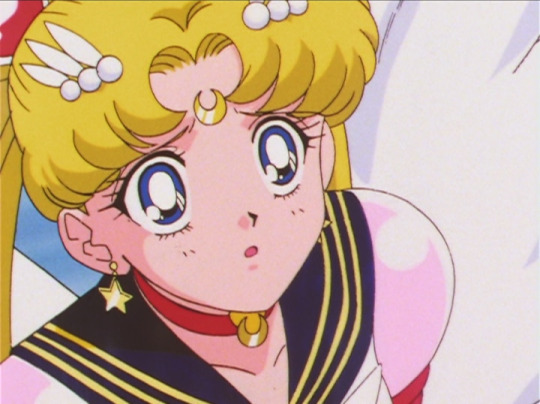
That in turn led me to consider how that kind of makes Usagi weaker as it removes a very useful weapon for her. After all, if you include the movies, Usagi uses some variant of Moon Tiara Action in practically every season prior to Stars.
However, dwelling more upon it I realized how this tiny change was all too appropriate for Usagi’s character development.
Firstly, by supplanting the Tiara with her Moon planetary symbol, Eternal Sailor Moon more closely resembles both Queen Serenity, her own Princess Serenity form and her future self as Neo-Queen Serenity.
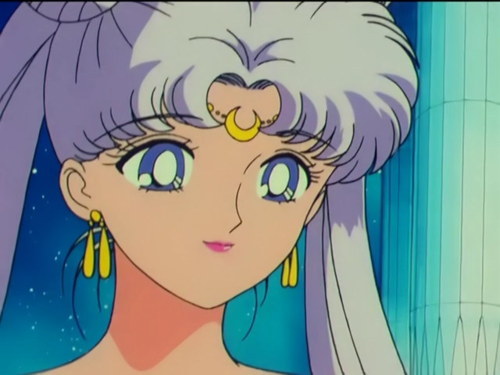


Since all three are objectively more powerful than Usagi typically is as Sailor Moon I think the change emphasises how she has ‘levelled up’ in her Eternal form. When combined with the angel wings, Eternal Sailor Moon shifts Usagi visually closer to her future self as NQS, which in the anime is implied to be her most powerful incarnation.* It is almost as though the visual was communicating that the Divine Miracle Magic that she’d previously drawn upon as Princess Serenity in Classic-SuperS had now become ingrained in her standard Senshi form and thus was more accessible to her.
It was in thinking of her previous efforts as Princess Serenity that I inevitably recalled her duel with Metalia/Beryl in episode 46 and realized that Eternal Sailor Moon was the first time since Classic that Usagi’s default attack was a healing technique not a destructive one.
Moon Healing Escalation was Usagi’s first healing technique but until Starlight Honeymoon Therapy Kiss (and it’s later upgrade, Silver Moon Crystal Power Kiss) it was also her only healing technique.
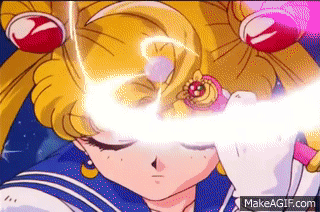
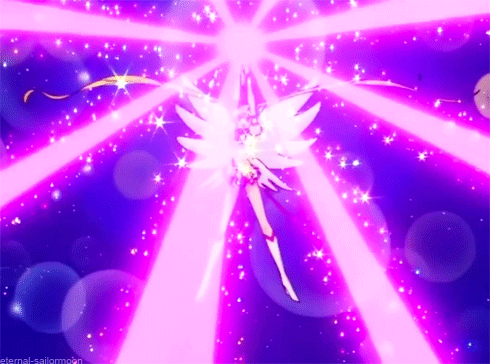
Between regaining healing techniques and ditching her tiara/other destructive attacks/weapons, I think this represents her subtle growth in both her power and status. After all, it is a sad fact of life that it is easier to destroy something rather than fix it, thereby making the latter far more impressive.**
This skewing towards healing power rather than destructive power is also (arguably) thematically appropriate given the nature of Sailor Moon as a female power fantasy as (rightly or wrongly) the act of healing is typically coded as feminine.
We can even take this further by examining things from the ‘opposite direction’ as it were.
Consider that in the climactic final episodes of Sailor Stars, Eternal Sailor Moon’s healing technique actually fails her when used against Galaxia. In later episodes, upon adopting her Princess Serenity form (complete with larger and more obviously angelic wings), she uses a sword to duel Galaxia.
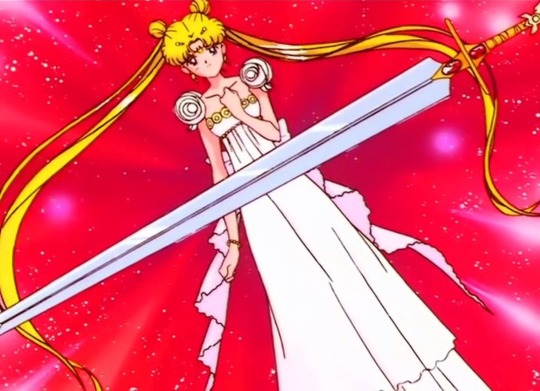
Obviously a sword is, at least predominantly, an offensive weapon and can therefore be viewed as symbolic of aggression; let’s leave any Freudian or gendered interpretations alone for today. Her use of the sword is highly uncharacteristic (in the anime). Even her explicitly offencive weapons (like the Cutie Moon Rod or Spiral Moon Heart Rod) weren’t as clearly aggressive nor obviously violent. Desperate times calling for desperate measures? Perhaps, but we might also speculate it was her subconsciously reacting to grief. Not only can grief make you act in ways you wouldn’t normally, but a sword after all was a weapon wielded by her lover in his Prince Endymion incarnation. Her lover whom Usagi had just learned Galaxia had murdered. In other words, amidst her grief she reacts by going too hard in the other direction after healing her enemy proves ineffective.
However, when all is said and done the sword fails her.*** Ultimately is simply escalates the conflict by prompting Galaxia to become Chaos Galaxia and thereby make Usagi’s chances of victory all the slimmer. If we wished to stretch things, you could perhaps say that this is a commentary about how war and violence ultimately begets yet more war and violence.
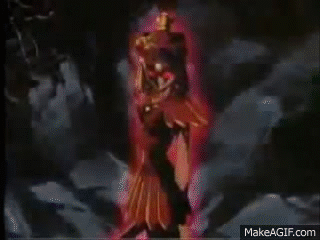
Even if that is an over extrapolation though, it still served to emphasis the point that a sword is not befitting of Usagi, that she was doomed to lose if she continued to battle with destroying her enemy as the end goal.
In fact, her road to real victory begins when she not doesn’t attack Galaxia but makes it easier for herself to be attacked. In the end, Usagi doesn’t confront her most powerful enemy as the God-Queen of the future, the demi-goddess Princess of the distant past, the sailor-suited soldier of love and justice in the present, nor even a humble school girl.
She does it by literally stripping herself of all those things, of stripping herself of everything in fact.
Her weapons? Gone.
Her other items, like her Tiare? Gone.
Her comrades? Gone, and they’d be powerless against Galaxia anyway.
And finally, even her clothes? Gone!
Beyond the Silver Crystal (an outward visualization of her heart/soul) and the angel wings (symbolic of her role as a saviour) she is completely (but tastefully) naked.
Usagi visually and quite literally is more vulnerable than she’s ever been, even more so than on her first night as Sailor Moon.

And yet this is Usagi at her actual most powerful.
It is her distilled to her absolute essence as a person, all other trappings removed. She’d just one person showing another they will categorically not harm them, that they bear them no malice and they have nothing to hide. That openness and compassion is what ultimately enables her to connect to the good within Galaxia and pull her away from the darkness that had corrupted her.
Usagi in this moment completely fulfilled her character arc.
· In the Dark Kingdom arc Usagi destroys (or seals away depending upon your POV) Beryl/Metalia.
· In the Hell Tree arc, Usagi resolves the over all plot via a healing technique (although it is functionally similar to a destructive attack). However, that only happens because the Hell Tree both instructs Usagi to do that and because it lets her. It is the equivalent of a sickly doctor instructing a nurse on what to do to make them better. The nurse might have the power but their agency as a healer is limited.
· In the Black Moon arc, Usagi, with help, destroys Wiseman/Death Phantom.
· In the Death Busters arc, Usagi does save Hotaru and ‘purify’ her. However, like the Hell Tree, that was something Hotaru wanted. Additionally, her purification functioned as a way to heal the body of someone sick and who wanted to sacrifice themselves, not someone actually evil. The evil in question was Pharaoh 90 and it is presumed that Usagi destroyed him (although it might’ve been Hotaru or the pair of them together).
· Forgive me for skipping the Dead Moon Circus arc as Chibiusa is the real protagonist there, and Usagi’s role is chiefly as a rescuer. It therefore doesn’t really apply, although the Nehelenia mini-arc from Stars is a different story. There, Usagi was a healer again, but she did it with the help of her loved ones and with the aid of her Tiare device. Nevertheless, we can see by this point Usagi’s capacity as a healer heroine had been gradually growing until we get to the battle with Galaxia.
By the end of series, Usagi has successfully healed Galaxia and it is neither with the aid of her comrades, nor with the power of a weapon or device, nor with any instructions from her ‘patient’ or any other third party.
Additionally, Galaxia (unlike Hotaru) wasn’t someone’s who was saved from a noble self-sacrifice or had a physical ailment that needs to be addressed. In Galaxia’s case, her very soul had lost it’s way and become corrupted. She had lost who she was supposed to be and her purpose in life had been perverted.****
When combined with how powerful Galaxia always was, how Chaos and the Star Seeds empowered her further, Usagi’s victory here cannot be understated.
Her ‘patient’ was more powerful than all her other adversaries, was in need of more healing than her other ‘patients’ and was more resistant to being healed. Not to mention, since she’d directly murdered her beloved friends (and indirectly aborted her future daughter), Usagi would’ve been forgiven for not even trying to salvage Galaxia
And yet, with no weapons, no backup and just the power of her heart and soul basically, Usagi succeeded.
After Stars the idea that Usagi could heal the entire planet after a global catastrophe and reshape it into a fairy tale crystalline utopia was all too believable.
What’s healing one planet when her ability to empathise had already healed a whole galaxy?
Who needs a tiara to reduce evil to dust when you can simply convince evil to be good?

*This is arguably symbolized by baby Hotaru’s vision of NQS transforming into Eternal Sailor Moon in episode 1 of Stars.
In fact, we might argue that a low-key subplot running through all of Stars (both the Nehelenia and Galaxia portions of it) is gradually transitioning Usagi closer to the person she is destined to become as Neo-Queen Serenity, hence why the first episode features the most explicit reference to her fate as Queen since R.
**Personally I am an atheist, but nevertheless I and others like me can grasp why deities in most major religions through history weren’t simply capable of mass scale destruction, but also of essentially manipulating reality to create things too.
By that same token, it’s little surprise that perhaps the widest spread religious figure in history was Jesus Christ who rarely (if ever) engaged in aggression or destructive acts, predominantly employing divine healing powers.
I suspect the attraction of such figures to human beings lies in the fact that on some level we know that, given the right time and resources, we mere mortals would be capable of destroying anything. Given time it’s all but certain we will develop the technology to even destroy planetary bodies. On the flipside, I think we also intuitively grasp that reversing such damage, of reattaching a limb, of stanching bleeding, etc, is far more difficult if not impossible. Hence we attributed the ability to do such things to larger than life Divine Entities.
*** Now that I think of it, it’s also poignant that Usagi tries and fails to defeat Galaxia with a sword when we take Sailor Uranus into consideration.
Uranus is of course associated with her weapon, the Space Sword and, like Usagi, tried and failed to use such a weapon against Galaxia.

Giving Uranus a sword is symbolically appropriate given her role as the leader of the more aggressive branch of the Sailor Team. Having her fail against Galaxia and Usagi consequently fail by in some way ‘mimicking her tactics’ is equally symbolically appropriate. Not only because of their ideological conflict in Sailor Moon S but also their tensions in Sailor Stars itself. In both situations Usagi’s more open, less aggressive, ideology was ultimately proven correct.
Thus in using a sword against Galaxia it represented how Usagi was always doomed to fail by taking the aggressive/destructive route and how she was arguably not being true to herself in that moment.
****It’s not to dissimilar to Darth Vader/Anakin Skywalker now that I think about it.
#My Essays#Sailor Moon#bishojo senshi sailor moon#pretty guardian sailor moon#pretty soldier sailor moon#usagi tsukino#tsukino usagi#princess serenity#neo queen serenity#Neo-Queen Serenity#eternal sailor moon#Sailor Galaxia#Galaxia#queen nehelenia#nehelenia#Sailor Uranus#tenou haruka#HARUKA TENOH#Queen Beryl#Dark Kingdom#Hell Tree#Wiseman#Death Phantom#pharaoh 90#Sailor Saturn#hotaru tomoe#professor tomoe#Queen Serenity#Darth Vader#Anakin Skywalker
298 notes
·
View notes
Text
let's talk about andi mack's worldbuilding
sorry this took forever to make! i've been pretty busy with school stuff and i kind of lost my inspiration for a bit, but i ultimately really enjoyed writing it! i wish i could've included more pics (tumblr has a max of 10 per post), and it kinda turned from less of a mini analysis to more of an extremely long rant... but i hope it's still a fun read!
i've been rewatching the show over the past few weeks (thanks again to @disneymack for the link!), and i’ve been noticing a lot that i never did the first time around. this is really the first time i’ve watched the show from start to finish since it aired, and it honestly feels so different this time - probably a combination of the fact that i’m not as focused on plot and can appreciate the show as a whole, and also that the fandom is much, much smaller now, so there’s a lot less noise. so the way i’m consuming this show feels super different than it did the first time, but the show itself doesn’t - it’s just as warm and comforting to me as it was the first time around, if not more so.
i think a lot of that can be attributed to andi mack’s “worldbuilding”. i’m not quite sure that this is the right word in this context, to be honest, because i mostly see it used in reference to fantasy and sci-fi universes, but it just sort of feels right to me for andi mack, because you can really tell how much love and care went into constructing this universe. for clarity, worldbuilding is “the process of creating an imaginary world” in its simplest sense. there’s two main types: hard worldbuilding, which involves inventing entire universes, languages, people, cultures, places, foods, etc. from scratch (think “lord of the rings” or “dune”), and soft worldbuilding, in which the creators don’t explicitly state or explain much about the fictional universe, but rather let it’s nature reveal itself as the story progresses (think studio ghibli films). andi mack to me falls in the soft worldbuilding category. even though it takes place in a realistic fiction universe, there’s a lot of aspects to it that are inexplicably novel in really subtle ways.
so watching the show now, i’ve noticed that the worldbuilding comes primarily from two things - setting and props, and oftentimes the both of them in tandem (because a big part of setting in filmmaking does depend on the props placed in it!).
one of the most obvious examples is the spoon. it really is a sort of quintessential, tropic setting in that it's the main gang's "spot", which automatically gives it a warm and homey feel to it. and its set design only amplifies this:
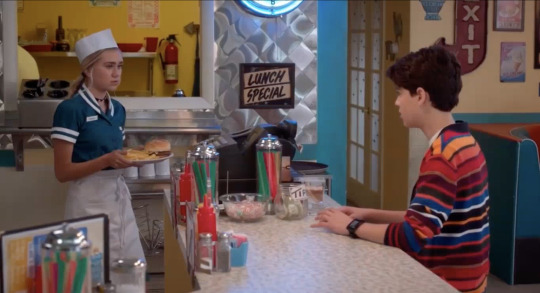
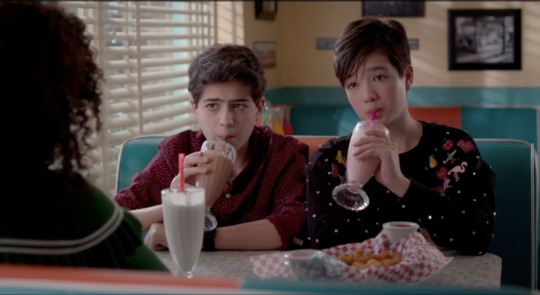
the choice to make it a very traditional 50s-style diner creates a very nostalgic, retro feel to it, which is something that's really consistent throughout the show, as you'll see. from the round stools at the bar, to the booths, to the staff uniforms, this is very obvious. the thing that i found especially interesting about it though is the choice of color. the typical 50s diner is outfitted with metallic surfaces and red accented furnishings, but the spoon is very distinctly not this.
instead, it's dressed in vibrant teal and orange, giving it a very fresh and modern take on a classic look. so it still maintains that feeling of being funky and retro, but that doesn't retract from the fact that the show is set distinctly in modern times.
of course, this could just be a one-off quirky set piece, but this idea of modernizing and novelizing "retro" things is a really common motif throughout the show. take red rooster records. i mean, it's a record shop - need i say more? it's obviously a very prominent store in shadyside, at least for the main characters, but there's no apparent reason why it is (until season 2 when bowie starts working there, and jonah starts performing there). a lot of the time, though, it functions solely as a record shop. vinyl obviously isn't the most practical or convenient way of listening to music, but it's had its resurgence in pop culture even in the real world, mostly due to its aesthetic value, so it's safe to say that it serves the same purpose in the andi mack universe.
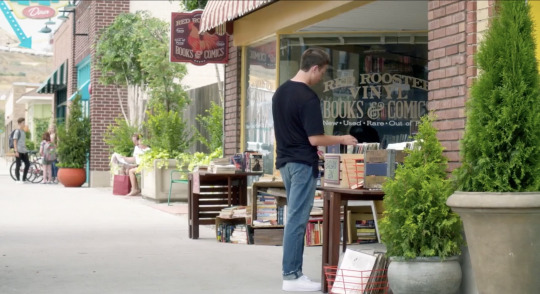
the fringe seems to be nostalgic of a different era, specifically the Y2K/early 2000s period (because it's meant to be bex's territory and symbolic of who she used to be, and its later transformation into cloud 10 is representative of her character arc, but that's beside the point). to be honest, exactly what this store was supposed to be always confused me. it was kind of a combination party store/clothing store/makeup store/beauty parlor? i think that's sort of the point of it though, it's supposed to feel very grunge-y and chaotic (within the confines of a relatively mellow-toned show, of course), and it's supposed to act as a sort of treasure chest of little curios that both make the place interesting and allow the characters to interact with it.
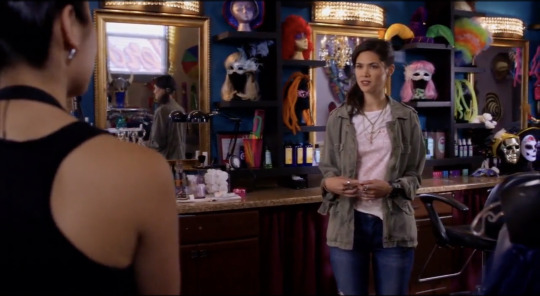
and, of course, there's andi shack. this is really the cherry on top of all of andi mack's sets, just because it's so distinctly andi. it serves such amazing narrative purpose for her (ex. the storyline where cece and ham were going to move - i really loved this because it highlights its place in the andi mack universe so well, and i'm a sucker for the paper cranes shot + i'm still salty that sadie's cranes didn't make it into the finale) and it's the perfect reflection of andi's character development because of how dynamic it is (the crafts and art supplies can get moved around or switched out, and there's always new creations visible).
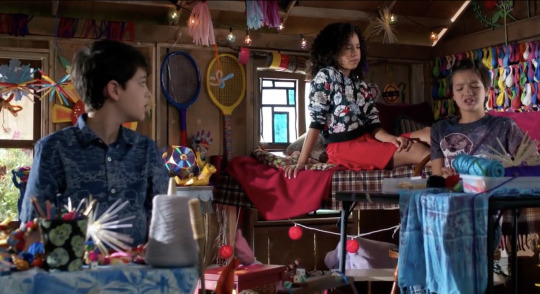
going back to the nostalgia motif though, the "shack" aspect of it always struck me as very treehouse-like. personally, whenever i think of treehouses, there's this very golden sheen of childhood about it, if that makes sense. i've always seen treehouses in media as a sort of shelter for characters' youthful innocence and idealistic memories. for example, the episode "up a tree" from good luck charlie, the episode "treehouse" from modern family, and "to all the boys 2" all use a treehouse setting as a device to explore the character's desire to hold onto their perfect image of their childhood (side note: this exact theme is actually explored in andi mack in the episode "perfect day 2.0"!). andi shack is no exception to this, but it harnesses this childhood idealism in the same way that it captures the nostalgia of the 50s in the spoon, or the early 2000s in the fringe. it's not some image of a distant past being reflected through that setting; it's very present, and very alive, because it reflects andi as she is in the given moment.
some honorable mentions of more one-off settings include the ferris wheel (from "the snorpion"), the alley art gallery (from "a walker to remember"), SAVA, the color factory (from "it's a dilemna"), and my personal favorite, the cake shop (from "that syncing feeling").
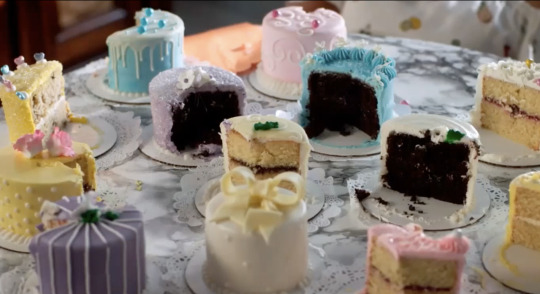
[every time i watch this episode i want to eat those cakes so bad]
these settings have less of a distinctly nostalgic feel (especially the color factory, which is a very late 2010s, instagram era setting), but they all definitely have an aura of perfection about them. andi mack is all about bright, colorful visuals, and these settings really play to that, making the andi mack universe seem really fun and inviting, and frankly very instagrammable (literally so, when it comes to the color factory!).
props, on the other hand, are probably a much less obvious tool of worldbuilding. they definitely take up less space in the frame and are generally not as noticeable (i'm sure i'll have missed a bunch that will be great examples, but i'm kind of coming up with all of this off the top of my head), but they really tie everything together.
for example, bex's box, bex's polaroid, and the old tv at the mack apartment (the tv is usually only visible in the periphery of some shots, so you might not catch it at first glance) all complement that very retro aesthetic established through the settings (especially the polaroid and the tv, because there's really no good reason that the characters would otherwise be using these).
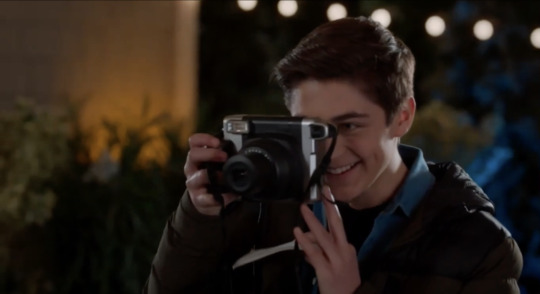
besides this, andi's artistic nature provides the perfect excuse for plenty of colorful, crafty props to amplify the visuals and the tone. obviously, as i discussed before, andi shack is the best example of this because it's filled with interesting props. but you also see bits of andi's (and other people's) crafts popping up throughout the show (ex. the tape on the fridge in the mack apartment, andi's and libby's headbands in "the new girls", walker's shoes, andi's phone case, and of course, the bracelet). not only does doing this really solidify this talent as an essential tenet of andi's character, but it also just makes the entirety of shadyside feel like an extension of andi shack. the whole town is a canvas for her crafts (or art, depending on how you want to look at it. i say it's both), and it immensely adds to shadyside's idealism. because who wouldn't want to live in a world made of andi mack's creations?
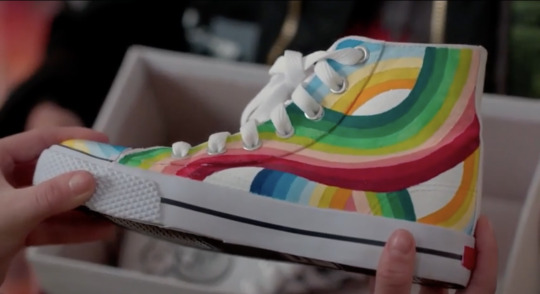
and, while it's not exactly a prop, the characters' wardrobe is undoubtedly a major influence on the show's worldbuilding. true to it's nature as a disney channel show, all of the characters are always dressed in exceptionally curated outfits of whatever the current trends are, making the show that much more visually appealing. i won't elaborate too much on this, because i could honestly write a whole other analysis on andi mack's fashion (my favorites are andi's and bex's outfits! and kudos to the costume designer(s) for creating such wonderful and in-character wardrobes!). but, i think it's a really really important aspect of how the show's universe is perceived, so it had to be touched upon.
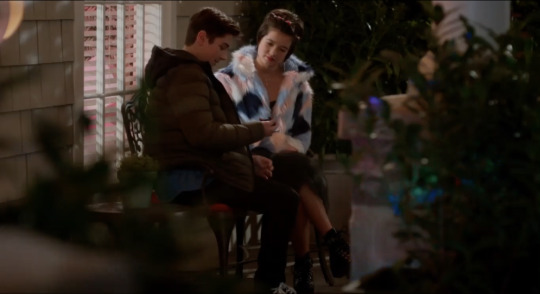
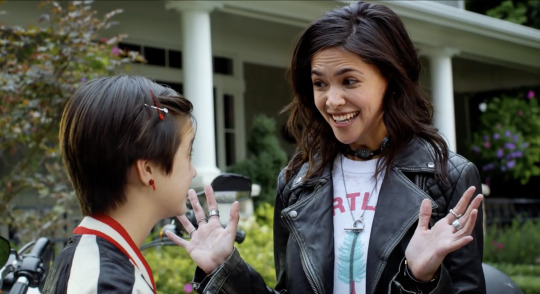
[^ some of my favorite outfits from the show! i am so obsessed with andi's jacket in the finale, and i aspire to be at bex's level of being a leather jacket bisexual]
and lastly, phones. this is a bit of an interesting case (pun intended), because the way they're used fluctuates a bit throughout the show, but i definitely noticed that at least in the first season terri minsky tried to avoid using them altogether. these efforts at distancing from modern tech really grounds the show in it's idealist, nostalgia-heavy roots, so even when the characters start using their phones more later in the show, they don't alter the viewer's impression of the andi mack universe very much.
so, what does all of this have to do with worldbuilding? in andi mack's case, because it's set in a realistic universe and not a fantasy one, a lot of what sets it apart from the real world comes down to tone. because, as much as this world is based on our own, it really does feel separate from it, like an alternate reality that's just slightly more perfect than ours, which makes all the difference. it's the idealism in color and composition in andi mack's settings that makes it so unmistakably andi mack. even the weather is always sunny and perfect (which is incredibly ironic because the town is called shadyside - yes, i am very proud of that observation).
the andi mack universe resides somewhere in this perfect medium that makes it feel like a small town in the middle of nowhere (almost like hill valley in 1955 from "back to the future"), but at the same time like an enclave within a big city (because of its proximity to so many modern, unique, and honestly very classy looking establishments). it is, essentially, an unattainable dream land that tricks you into believing it is attainable because it's just real enough.
all this to say, andi mack does an amazing job of creating of polished, perfect world for its characters. this is pretty common among disney channel and nickelodeon shows, but because most other shows tend to be filmed in a studio with three-wall sets, andi mack is really set apart from them in that it automatically feels more real and tangible. it has its quintessential recurring locations, but it has far more of them (most disney/nick shows usually only have 3-4 recurring settings), and it has a lot more one-off locations. it's also a lot more considerate when it comes to its props, so rather than the show just looking garish and aggressively trendy, it has a distinctive style that's actually appropriate to the characters and the story. overall this creates the effect of expanding the universe, making shadyside feel like it really is a part of a wider world, rather than an artificial bubble. it's idealism is, first and foremost, grounded in reality, and that provides a basis for its brilliant, creative, and relatable storytelling.
tl;dr: andi mack's sets and props give it a very retro and nostalgic tone which makes its whole universe seem super perfect and i want to live there so bad!!
#andi mack#buffy driscoll#cyrus goodman#jonah beck#tj kippen#tyrus#ambi#bex mack#analysis#film analysis#disney channel
95 notes
·
View notes
Note
How do you feel about Pink Astronaut. Personally I feel like Paulina deserved a little better than the writers gave her.
I'm 99% sure that's the ship name for Danny x Paulina, right?
(Which probably says a lot about my engagement with the shipping side of the Phandom 😅.)
TBH I don't have any strong thoughts or feelings about it either way.
In all cases I'm a very gen-focussed fan - my interests tend run more in the direction of character psychology, non-romantic platonic/ familial relationships, lore, mystery and theme. It's a personal thing but I just don't read romantic/sexual intent/attraction into character interactions unless they're explicitly framed/intended as such and the way much of the shipping community seems to do so goes completely over my head.
Which isn't to say that I avoid all ship-fics, or that there aren't a number of noncanon ships that I enjoy across different fandoms, but for the most part I favour genfic and when I do read shipfic they tend to be the stories that focus on personality, emotional chemistry and personal/emotional compatibility. And when it comes to thinking about "ships" myself I tend to lean more towards times when characters have canonically expressed that kind of interest, the reasons why they would be compatible/ find each other attractive, how they feel about it and what it says about them.
But back to Paulina:
I think you're right - as a character she (along with basically every human character outside of the main trio, the Fenton family and sometimes Valerie) suffers massively from underdevelopment because of the show's nature as for the most part an episodic kid's superhero-comedy with an ooky-spooky gimmick. Danny Phantom the show is a place where The Status Quo is God and the Rule of Funny/Cool/Drama supersedes everything, up to and including the characters and their consistency.
(You can even see this and the obviously conflicting visions of different parts of the creative team effect the main characters too. Danny suddenly carrying the Jerk Ball in service of a generic "don't be superficial/ materialism is bad" story in Livin' Large, how Tucker is basically learning the same lesson twice across What You Want and King Tuck, the multiple times where Sam's more abrasive negative traits are used as a source of plot/conflict but are never meaningfully addressed or developed because the writers want to keep using those traits for drama and eventually to use her character as the Morally Righteous Generic Love Interest Behind Danny's Heroism... et cetera et certera et cetera.)
Literally every character in DP is done a disservice by the show's writing and Paulina runs into the same problem. She's chained to the post of a very specific narrative function/ character archetype and never intentionally developed beyond what's needed to serve the Plot/ the Joke.
She's clearly written to be the Rich Plastic Mean Girl à la Regina George, and while there is a potentially very interesting character beneath that surface appearance - which we can see in places like Parental Bonding where she shows emotional intelligence by immediately clocking that Sam is actually jealous of Danny's attraction to her, and in her "if my skin is perfect, I'll be perfect" line from My Sister's Keeper which hints at some potentially significant appearance-based self-worth issues - the show itself basically only ever uses her "Pretty Girl" and "Popular A-Lister" status as a source of surface-level character drama for the trio and as a rare plot-convenient situational ally in dire circumstances. Her actions show a consistent characterisation but it's so rudimentary that it barely clears that archetype to become its own thing.
I think if Danny Phantom had taken more structural and tonal influence from Spiderman (or even something like Disney's Kim Possible) rather than Fairly Odd Parents - still keeping things mostly light-hearted but with some extra focus on character consistency and layering some ongoing character arcs over each season - there could have been a lot of potential to develop and flesh out Paulina as a narrative foil/ ongoing rival to Sam and her own character arc. It also could have added some more meaningful non-stereotypical female character dynamics, which are disappointingly but perhaps not surprisingly lacking from a "for boys" Nicktoon headed by a man who named himself "Butch". But as it is she unfortunately falls into that No Man's Land for me, where she isn't developed enough to have much deeper canon worth investigating and isn't really thematically/narratively significant enough that I'd want to develop her myself for story purposes.
As for the Pink Astronaut ship itself, all I can say is that, at least for me, canonically it... isn't really one. At least in terms of what I personally characterise as a 'relationship'. It's stuck at a very shallow level; Danny has a superficial surface-level infatuation with Paulina because she's pretty and popular, and Paulina looks down on "geeky dork loser" Danny Fenton while having a superficial surface-level infatuation with Danny Phantom as "the cute ghost-boy who rescued her". There's no real sense of actual personal chemistry based on them knowing, appreciating or even seemingly caring to know who the other is as a character. None of their "romantic" hijinks really involve them learning anything meaningful about each other or even having a proper conversation. Paulina "dates" Fenton purely to piss off Sam, then "Paulina" shows personal interest in Danny but it turns out to actually be Kitten trying to piss off Johnny, and when she does show interest in him after the reveal in Reality Trip it's kind of obvious that it's because she's interested in dating Phantom and his secret identity wouldn't have mattered either way. And meanwhile Danny spends most of his time either too busy with ghost stuff to properly pay attention to her as a person, or he never really shows any interest or understanding beyond his fantasies about how she's very conventionally pretty (which he finds attractive/desirable) and popular (which he wants to be).
So while there's a lot of potential for people to write that ship in terms of them being two very different characters from different backgrounds who come to learn about each other as people, come to appreciate each other on a personality level and develop an actual romantic/emotional connection based on that... within the show itself that surface level is sort of where it starts and ends.
And like I said, I'm not a shipper. Even with the bigger, more canonically-substantiated ships I look for the personalities moreso than the romance.
So I don't really have any strong thoughts or feelings about it either way.
Sorry if that's not a satisfying answer.
But I do agree: like most DP characters, Paulina Sanchez has a lot more character potential than the writing allowed her.
#that was an awful lot of words for an#It's fine#I don't mind it either way#I'm just not really into shipping#I'd rather focus on exploring canon characterisations and personal dynamics over romance#Pink Astronaut#Danny Phantom#Paulina Sanchez#youmaycallmeyourhigness#3WD Answers
35 notes
·
View notes
Text
masculaxi character analysis/appreciation
it's been over a year since gala masculaxi's release and i'm still not over it
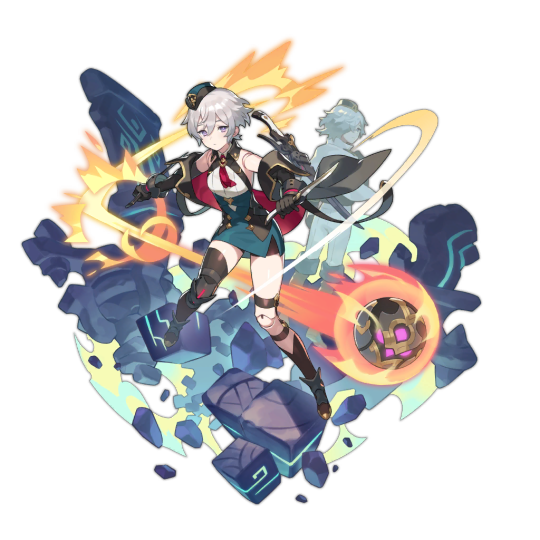
(heavy dragalia lost spoilers ahead)
(gala mascula does not exist btw) i just love how mascula and laxi are designed as two parts of a whole, basically one half of the same ideal/same person. you can't have one without the other. if you heavily favor one over the other i dont trust you... only half joking. when laxi went berserk and mascula had to save her by giving her his heart in their debut ch11, that was just... such a moment... it shows them at their most "separate" (laxi in berserk/annihilation mode, and mascula stopping at nothing to disengage combat.) which sets us up for their development as two hearts in one body. in masculaxi (flame blade)'s story, they're still at odds but they begin to learn to cooperate in the same body, and this is the beginning of their "convergence." in ch14 of the main story is when we see the beginnings of eden mode. when all the androids sacrifice themselves for euden and co to advance, mascula realizes it his empathetic heart that influenced them and led them to their painful deaths. he then shuts down his ego circuit out of guilt. when the team is in a tight spot, and only masculaxi can save the day (since their body is unaffected due to the miasma only affecting organic lifeforms,) laxi goes into their heart to search for mascula and plead him to help her. all this time, laxi had envied mascula's heart for being "more human," but realized that maestro had written the fear of death in all of the android's hearts, and as such, laxi understood the weight of their yearning for peace, with the act of their self-sacrifice for euden. (later we do learn with gala masculaxi that mascula had been influencing laxi more. here we see laxi's influence on mascula to urge him to fight.) laxi gets mascula out of the gay baby jail zone, releases her limiters, and activates annihilation mode hastily. mascula then guides her attacks to the correct targets, which is the first instance we see of mascula engaging in any sort of fighting. in this state of laxi's annihilation mode combined with mascula's guided assault, a new mode beyond annihilation mode becomes available to them: eden mode, when their hearts become one. this mode concentrates all the mana around them inside their body's mana kiln, and gives them even more power. mascula still dislikes fighting and does not want to do it as much, but has a newfound conviction and will not run away when he is needed. an interesting line here is mascula saying this: ▷It's as if he knew our hearts would one day become one. But how...?◁ indicating that from the start, they were truly two halves of a whole ideal. shortly after the release of ch14, we get the release of the flame dagger gala masculaxi unit, which contains eden mode in their gameplay, and expands upon the "two hearts acting as one" deal they have going on. laxi, mascula, and luca head to the ruins of maestro's lab in order to gain more clues on how eden mode works. laxi equips a new armament meant to accommodate eden mode (and demands praise of how good she looks, lol. also laxi is much more snarky in this story which is a treat. she's so funny. but also this shows mascula's emotional influence on her!!!!!) laxi learns of how eden mode works, and essentially it's a release of all limiters and rerouting all circuits to their internal mana kiln, but elimination protocol is activated automatically as well which does not make any distinction between friend and foe. it enhances laxi's combat ability, but mascula has to take care of elimination protocol since he has access and control of it. hence, in eden mode, laxi goes all out in attacking, while mascula controls the body's movements and targets. however this is only possible if their hearts act as one. the two are attacked by dyrenell forces and activate eden mode against them, but mascula temporarily loses the will to fight in the middle of the battle, destabilizing and deactivating eden mode. luca is captured and a villager shields them from an oncoming attack, believing in mascula's peaceful ideals. laxi engages tactical retreat and they escape. they engage in a plan to save luca but are attacked by imperials again. they try to go into eden mode but mascula once again disengages eden mode. mascula tells laxi of his regrets and frustrations that he keeps holding her back, but laxi tells him that she found herself synchronizing with him. with the villager (that mascula had saved before and in turn protected masculaxi earlier,) laxi found the value in mercy for enemies. by having laxi bend towards mascula's will, they're able to take on the imperials who chased after them with a truly synchronized eden mode. ▷Laxi, give me the strength to fight!◁ Granted. Now give me the kindness required to temper my actions. ▷Heh. Take all you need!◁ their system strain falls, and they're able to defeat the imperials. laxi, mascula, luca, and euden talk together after all is done. laxi takes interest in a cat, while mascula teaches her how to interact with it. Euden: Laxi and Mascula say the maestro who made them was a peace-loving man, but... Luca: No, I getcha. Why would some peacenik give something THIS much power? ch14 and their gala story really shows how the two embodied different sides of the same ideal -- "fighting for peace," and how they begin to converge upon that ideal. initially laxi only focused on "fighting" and mascula only focused on "peace," but A compassionate heart. ▷The courage to fight.◁ -Eden Mode, activate!- their character development after this is a bit wonky at times because it sets up for gala mascula who is really poorly written and doesn't necessarily align with the ideals established within ch14 and gala masculaxi, or even the development directly before it either. with ageless artifice and ch18 (when the team first enters the faerie kingdom and gets lost,) we get teasers of mascula with his own body. in ageless artifice, eirene steals mascula's body and intends to use it against masculaxi, but mascula takes control of his body and proclaims that his body isn't necessarily him, but what IS him is his resolve to fight for peace alongside his friends. (stays in line with gala masculaxi, right?) in ch18 we also see mascula having a "nightmare/illusion" in which he gains his body back but at the cost of laxi going berserk once more, showing that they truly cannot function at their "fullest ideal" without each other in the same body. laxi asks mascula if he wants his own body back, and mascula says he sometimes misses it but overall he wants to continue fighting with her the way they are. this is echoed in ch19, take this exchange for example: Mascula, I know you were thinking of your own body while lost in the mountain's illusions. You gave up your body to save me, and I owe you an apology for that. ▷Don't apologize—I wanted to do it. Plus, being with you makes me happy.◁ I want to see a peaceful world just as we are in this body now—together. ▷I feel the exact same way.◁ ▷No more hesitation. You and I are going to fight with Maestro as a team.◁ And together... ▷...we will bring peace.◁ reaffirming their ideals together and keeping in line with their development, right? mascula doesn't WANT his own body back. he wants to keep fighting with laxi, that's THE WHOLE POINT OF THEIR CHARACTERS. which does not make sense when we get the remote control BS IN THE SAME CHAPTER??? (teased from the ending of ageless artifice with chelle) and mascula has his own body again as a remote control system. now the portrayal in the main story wasn't AS bad but... the real problem comes to gala mascula as an adventurer with his stories and voice lines. this "mascula" proclaims of how much he loves/misses his body and how he "doesn't need laxi dragging him around anymore." like sure he sometimes feels being in laxi's body with her is bothersome but overall, at his heart, he wouldn't really say something like that??? mascula your voice lines are so contradictory to what just happened in the main story and what you said in ageless artifice what happened!!!!!!! his adventurer story lacks the cooperative laxi-mascula dynamic we knew and loved, and instead pushes mascula front and center to try to push him to do things himself. we didn't really need mascula getting his own body back anyways, but you COULD'VE AT LEAST written it so that they have more emphasis on cooperation with each other?? god im sorry i just. AUGH he's so OBVIOUSLY hastily pushed into their development arc and he loses his characterization. it's obvious gala mascula wasn't intended to be a thing in the initial plan for masculaxi... i am not forgiving every single one of you who sent in feedback for playable mascula. once again only half joking... maybe only a quarter joking. 1/8ths joking. radioactive decay graph joking. (also just a tiny nitpick: you can apparently run gala mascula and laxi/gala laxi on the same team. lore compliancy who? eden mode can't be activated while the remote control unit is active. but whatever) though another interesting plot point is brought up in his story though? maestro's origins, the writing of "seek peace" on mascula and laxi's bodies being in a language that only the sky city ark people would know.. with such an elaborate plan for such a complex android duo, and everything else mysterious about this man, just who is he? his master plan of masculaxi was really amazing to see come to fruition... maestro fought on the side of dyrenell, against dragons -- against elysium you could say. although ex machina seeks the destruction of terrestrial life because they "allied with the dragons" (a misconception,) on the contrary maybe maestro aimed to create an ultimate weapon for terrestrials to defend themselves against the dragons. however this weapon had to also understand the value of what it was fighting for -- learning for itself how to go about "fighting for peace." thus, the creation of the twins mascula and laxi; two halves of a whole. by having a compassionate and adaptable heart, they can change with the times, understand the people around them, and decide on their own what the best course of action is in various situations. i love love LOVE masculaxi and how they're written!! (for the most part.) two of my faves in the game and i love them and their characterization so much, i just wish more people could see the intricacies of their relationship and how they're literally like. 1/2 of the same thing. it's such a beautifully written dynamic and development, and i want others to appreciate it too.
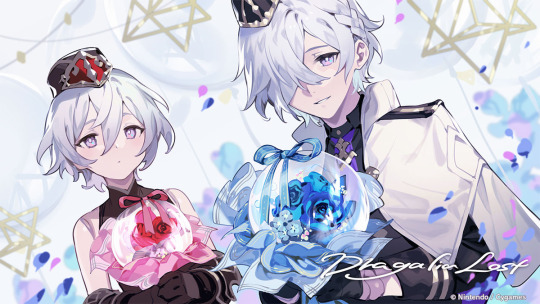
a little bonus, in this character art, you can see the "star tetrahedron" shapes. in sacred geometry symbolism, the "star tetrahedron" is the sixth shape enclosed within "metatron's cube." these shapes, and this cube, are said to maintain the balance of the world itself and its flows/processes. as for the "star tetrahedron" itself, it represents duality: physical body and spiritual self; male and female; and heaven and earth. this ties into mascula and laxi's characters: mascula controlling the "mind" in eden mode while laxi focuses on the attacking "body;" and mascula and laxi being of different genders. as for "heaven" and "earth," this could represent maestro coming from the sky city ark, and masculaxi being technology intended to aid humans. alternatively for "heaven" and "earth," the fact that the star tetrahedron is enclosed within "metatron's cube" may be a pointer to metatron in-universe. the archangels all have white hair, a trait shared by masculaxi. additionally, sandalphon is somewhat mechanical/technological herself. masculaxi being man-made (of the earth,) versus their potential connection to the angels (of the heavens.)
8 notes
·
View notes
Text
A Comparison of RTD and Steven Moffat: Saving The Day
So for this analysis I’m going to compare when Moffat and RTD save the day well and when they save it poorly. There are a few bits of criteria I need to explain.
First I will only be including main series, no Torchwood, no spin-offs, and no mini episodes.
Second, I have to define what makes a good and a bad ending (my examples will come from episodes written by neither of them):
Bad endings include when the sonic saves the day (see The Power Of Three) (there are exceptions, see below), when a character spouts some useless technobabble that doesn’t make any scientific sense/when it doesn’t make logical sense in general, when the Doctor invents/presents a machine/equipment that miraculously stops the baddy and is never referred to again (see Journey To The Centre Of The TARDIS), and any other ending I deem to be bad (see The Vampires of Venice)
Good endings include when the sonice activates a device that has been well established to save the day, when technobabble is used that actually makes some scientific sense, and just generally when the baddy is destroyed in what I deem to be a creative manner that makes sense with all the things that had been set up in that episode (see The Unquiet Dead).
There will also be cases where there isn’t really a day to be saved, however this happens more often with Moffat.
Let us begin (obviously there will be spoilers but the last episode in the list aired nearly 4 years ago so what you doing with your life).
RTD:
Rose: Bad
What even is anti-plastic?! Like seriously, he’s faced the Autons loads of times and has never thought to use it any other time.
The End Of The World: Bad
The Doctor just goes up to the appearance of the repeated meme (ha meme) and rips its arm off. He then just summons Cassandra back by twisting a knob which apparently everyone can do if “you’re very clever like me”.
Aliens Of London/World War Three: Good
Just nuking them all was a bit dodgy but I’ll give it to him purely because it had been set up earlier in the episode and it is a genuine option that could have been taken.
The Long Game: Good
The heating issue was set up within 2 minutes of the episode starting. It’s always good to see the Doctor using his enemies weakness against them.
Boom Town: Good
Only just. It’s technology that hadn’t been showcased ever before and came out of nowhere, but I’m allowing purely because it was setting up The Parting Of The Ways.
Bad Wolf/The Parting Of The Ways: Good
See above. It was set up the story before so it works.
The Christmas Invasion: Bad
This was so close to being good. If RTD had just let the Sycorax leader be honourable then everything would have been fine. Instead he had to let him be dishonourable and then the Doctor through the Satsuma at a random button that for no apparent reason caused a bit of floor to fall away.
New Earth: Bad
It only makes sense if you think about it for less than 10 seconds as just pouring every cure to every disease ever into a giant tub and then spraying said supercure onto them all, then having them hug each other to pass it on. That is suspending my disbelief just a bit too far.
Tooth And Claw: Good
Everything is set up in the episode so I’ll allow it but I fail to see how Prince Albert had the time to ensure that the diamond was cut perfectly.
Love And Monsters: Bad
It’s Love And Monsters. Need I say more?
Army of Ghosts/Doomsday: Good
It was very clearly set up throughout the episode.
The Runaway Bride: Bad
I don’t like how a few bombs can supposedly drain the entire Thames.
Smith And Jones: Good
All the events were well established
Gridlock: Good
It’s a fairly bland way to save the day, just opening the surface to all the drivers. But how else could he have done it?
Utopia/The Sound Of Drums/Last Of The Time Lords: Bad
As much as I like the idea that he tuned himself into the archangel network, he basically turned into Jesus. It is arguably the least convincing ending in modern Doctor Who history.
Voyage Of The Damned: Bad
Why was he the next highest authority? If he’s the highest authority in the universe why didn’t they default to him in the first place? If not then why not default to Midshipman Frame? And if he’s somehow in between them then why? Also Astrid killed herself for no reason when she easily could have jumped out of the forklift.
Partners In Crime: Good
It works in the context of the episode, but I don’t see why they needed two of the necklace things.
Midnight: Good
It’s human nature, you can’t get more well set up than that.
Turn Left: Good
It works logically
The Stolen Earth/Journey’s End: Bad
Donna just spouts a load of technobabble whilst pressing buttons and then the Daleks are magically incapacitated.
The Next Doctor: Bad
Why do the infostamps sever Hartigan’s connection with the Cyberking? As far as I remember it ain’t explained.
Planet Of The Dead (co-written with noted transphobe Gareth Roberts): Good
A good couple scenes are dedicated on getting the anti-gravs set up.
The Waters Of Mars (co-written with Phil Ford): N/A
The day isn’t really saved cause everyone still dies anyway.
The End Of Time: Good
Using a gun to destroy a machine is much better than using the sonic to destroy it.
Summary for RTD:
Out of 24 stories written by him, I deem 10 to be bad endings with 1 abstaining. That’s 41.7% of his episodes (43.5% if we don’t count any abstaining).
Steven Moffat:
The Empty Child/The Doctor Dances: Good
You’ll see this a lot with Moffat, he knows how to explain things without stupefying levels of technobabble. “Emailing the upgrade” is a perfect example of this.
The Girl In The Fireplace: Good
Some basic logic, the androids want to repair their ship, but they can’t return to it, they no longer have a function so they shut down.
Blink: Good
Always loved this one, getting the angels to look at each other, however they do look at each other sometimes earlier in the episode.
Silence In The Library/Forest Of The Dead: Bad
This is more of a problem with the setup of the episode, I don’t like that he can negotiate with the Vashta Nerada. I’d rather see them comprehensively beaten, but I guess it’s good for the scare factor that they can’t be escaped from.
The Eleventh Hour: Good
He convinced the best scientists all around the world to set every clock to 0 all in less than an hour. In the Doctor’s own words “Who da man!”
The Beast Below: Good
The crying child motif pretty much ended up saving the day (well for the star whale, life went on as normal for pretty much everyone else).
The Time Of Angels/Flesh And Stone: Good
The artificial gravity had briefly been set up earlier so I’ll allow it.
The Pandorica Opens/The Big Bang: Good
Everything had been set up perfectly, the vortex manipulator, the Pandorica’s survival field thingy, the TARDIS exploding at every moment in history.
A Christmas Carol: Good
Literally the entire episode is the Doctor saving the day by convincing Kazran not to be a cock.
The Impossible Astronaut/Day Of The Moon: Good
The silence’s ability to influence people is their whole thing, so using it against them is a good Doctory thing to do.
A Good Man Goes To War: N/A
The day isn’t really saved, Melody is lost, but River shows up at the end so is all fine? I love the episode it’s just the day isn’t really truly saved (yes I know Amy was rescued but she still lost her baby).
Let’s Kill Hitler: N/A
There isn’t really a day to be saved. They all get out alive but no one is really saved other than maybe River but we all knew she was gonna live anyway.
The Wedding Of River Song: Good
Whilst opinion is divided on the episode, the ending still works. the Tesseracta was established in Let’s Kill Hitler, and the “touch River and time will move again” was established well in advance.
The Doctor, The Widow And The Wardrobe: Bad
I don’t like how the lifeboat travels through the time vortex for no reason but to rescue the dad. It don’t make no sense and I don’t think it’s explained
Asylum Of The Daleks: Good
Oswin had access to the Dalek hive mind so of course she should be able to link into the controls and blow everything up.
The Angels Take Manhattan: Good
Paradoxes really do be something powerful, and they even acknowledge how nobody knows if it’d work so I’ll let it slide.
The Snowmen: Bad
Lots of people cry at Christmas, why are the Latimers anything special?
The Bells of Saint John: Good
The whole episode is about hacking so why shouldn’t the Doctor be able to hack the spoonheads
The Name Of The Doctor: Good
It was the story arc for the season pretty much, so of course it was explained well in advance.
The Day Of The Doctor: Good
Both the storing Gallifrey like a painting and the making everyone forget if they’re Human or Zygon works in the context of the episode.
The Time Of The Doctor: Bad
Since when were the Time Lords so easily negotiated with?
Deep Breath: Good
I like the dilemma over whether the half-face man was pushed or jumped.
Into The Dalek: Good
It’s set up well with this new Doctor’s persona of actually not being too nice of a guy (at first).
Listen: N/A
There isn’t a day to be saved. It’s just 45 minutes of the Doctor testing a hypothesis and I low-key love it.
Time Heist (co-written with Steven Thompson): Good
It works logically so I’ll allow it however it isn’t very well set up at all.
The Caretaker (co-written with noted shithead Gareth Roberts): Good
The machine to tell the Blitzer what to do was set up well in advance so I’ll allow it.
Dark Water/Death In Heaven: Good
The fact that Danny still cares even as a cyberman is set up fairly early on after his transformation.
Last Christmas: Good
He does use the sonic to wake up Clara but he convinces the others to wake up through talking so I’ll allow it.
The Magician’s Apprentice/The Witch’s Familiar: Good
It’s set up well with that little scene from actually inside the sewers.
The Girl Who Died (co-written with Jamie Mathieson): Good
IDK why the vikings would randomly keep electric eels but they’re set up well so I’ll ignore it.
The Zygon Inversion (co-written with Peter Harness): N/A
Not including this one as it’s only the second part and I’d argue the ending is most likely Harness’.
Heaven Sent/Hell Bent: N/A
Again there isn’t really a day to be saved, yes Heaven Sent really is amazing but it’s only the first part and, being completely honest, he dies several billion times before finally getting through the wall.
The Husbands Of River Song: N/A
Again there isn’t really a day to be saved here.
The Return Of Doctor Mysterio: Good
He gets Grant to catch the bomb which is good. But he does just sonic the gun out of Dr Sim’s hand and says UNIT is on its way which just sort of wraps it up very quickly.
The Pilot: N/A
No day to be saved here.
Extremis: Good
You could technically call it the sonic saving the day, I consider it to be the Doctor emailing the Doctor to warn him of the future.
The Pyramid At The End Of The World: Good
The fire sanitising everything makes sense and it’s in character for Bill to love the Doctor enough to cure his blindness in return for the world
World Enough And Time/The Doctor Falls: Good
Yes it is the sonic just blowing the cybermen up, but it’s blowing them up with well established pipelines so I’ll allow it (also the story is amazing).
Twice Upon A Time: N/A
No day to be saved here. Just Doctors 1 and 12 getting angsty about regenerating.
Summary for Steven Moffat:
Out of 39 stories written by him, I deemed 4 to be bad with 7 abstaining. That’s 10.3% of his episodes (12.5% if we don’t count any abstaining).
Conclusions:
Moffat was much better at saving the day than RTD
Moffat liked telling stories where the day didn’t actually need to be saved
I’ve spent way too long on this and I need to sleep
If I spent as much time on this as my coursework I’d probably pass
If you’re still reading this, you probably need to get a life
#doctor who#steven moffat#rtd#in case you can't tell I really don't like RTD#Remember the Superwholock days when everyone ripped the shit out of Moffat#what am I doing with my life#tardis#rose tyler#martha jones#donna noble#amy pond#rory pond#rory williams#river song#clara oswald#Bill Potts
57 notes
·
View notes
Text
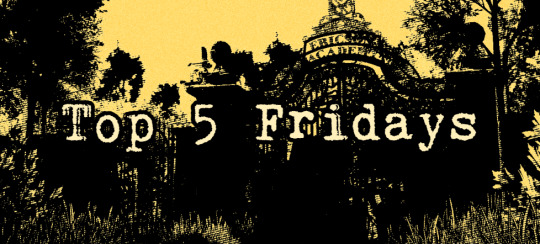
Top 5 Dumbest Things in The Final Season
I’ve played TWDG a lot, and I can confidently say that The Final Season is my favorite installment, and I’d argue that it’s the best of the series in terms of visuals, controls, characters, and storyline... but that doesn’t mean it’s a perfect game by any means. In fact, there are a lot of issues and inconsistencies you could pick out within the story and the arcs of our characters.
But today I don’t wanna tackle the big problems. The issues on today’s list aren’t a big deal and won’t ruin the experience of the game-- they’re minor and just really, really dumb. They’re things that you probably wouldn’t even notice during your first or second playthrough of the game. Honestly, most of these probably could be easily explained with “shhhh, don’t think about it.”
But I’m thinkin’ about them because they’re dumb. So, here's my Top 5 dumbest things in TFS. Do note that these Top 5′s are all in good fun, and they’re my opinion. Obviously.
[also, most of the screenshots used here are from @pi-creates-- if you haven’t checked out Pi’s blog, I highly recommend you do! :D]
5. Doors make no sense.
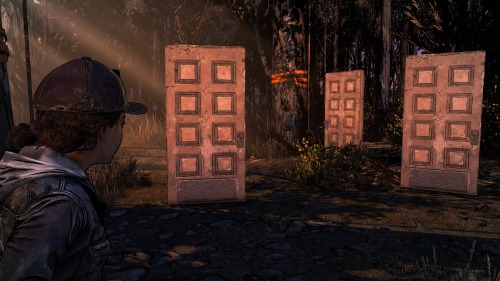
The doors in this game are dumb and make little sense. And you might be scoffing like, “Really? Doors?” and to that I say, “YES DOORS OKAY!”
If you’re like me, you like to look at everything in hopes of finding interesting details and maybe an easter egg. If you look at the all the doors after breaking out of the dorm in ep1, they all have different locks which... why?
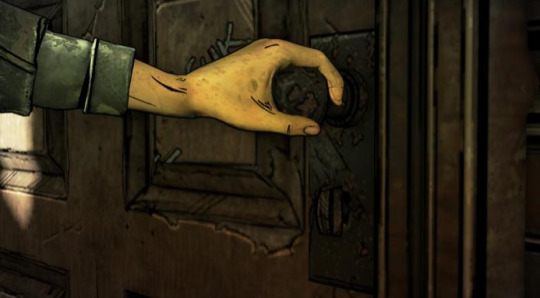
Wait, shouldn’t Clem be able to open this one...? The lock is right there on the outside.
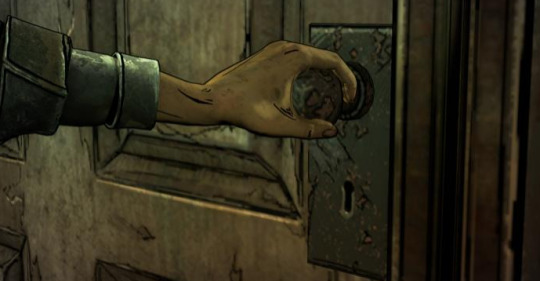
Why are they different? Also, why are the dorms lockable from the outside? Like, okay, I get it-- ya gotta lock up the troubled youth so that they don’t escape. Fine. Cool, I can accept that... except does this mean that someone had to go around and unlock all the dorms every morning before the apocalypse? What if you forgot a door and a handful got stuck in there for the day? What happens if you lock all these children in their rooms and a fire starts??
And don’t you look at me and try to be like “Pfft, there’s not gonna be a fire--” excuse me?? With Aasim hanging around, and Mitch for that matter, you’re gonna tell me that the odds of fire happening are 0%?
Well, y’know, fine. If there’s a fire, then the kids can just escape through the windows... oh wait--
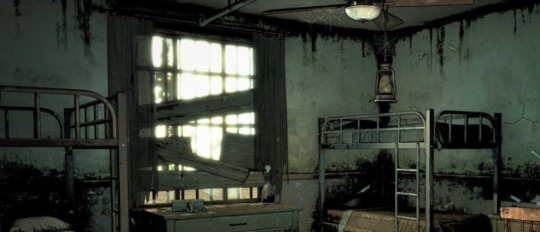
Weeeeeell fuck the troubled youth, I guess.
But the dorm doors aren’t even the dumbest doors here-- no, no. That would be the god damn basement door that apparently locks from both sides because game’s gotta game and I guess Marlon has the key?? This dumb door makes no sense.
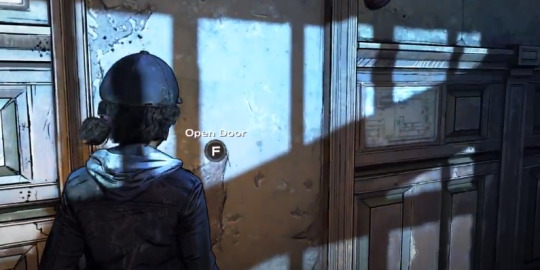
Again! I feel like this is a safety hazard?? Sure hope no one gets locked down there, otherwise, you’re fucked I guess?? because there’s no way to unlock or open it from the inside?? After Brody dies and Clem’s looking for a way out, you’d think that she should be able to just open the door at the top of the stairs now that she’s inside but nooooo-- game’s gotta game.
Ugh, dumb doors!
4. Abel’s magic shotgun
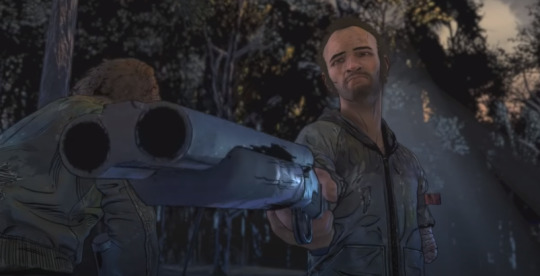
Did you guys know that Abel actually has a special shotgun? A magical shotgun, if you will?
It’s true, he does. He uses a shotgun that, when he fires it, the buckshot curves around to hit the target when the plot demands it.
It’s true! And it’s dumb!
I know this, because if you yell for Violet to shoot Lilly in ep2, Abel will throw AJ to the grab, pull the shotgun out of nowhere, and fire at both her and Louis.... but somehow--
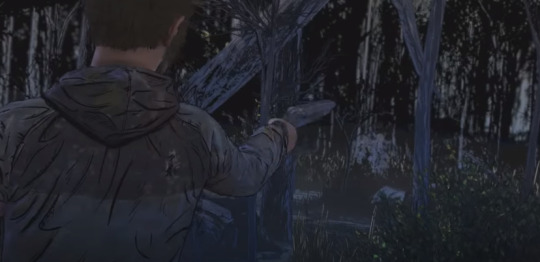
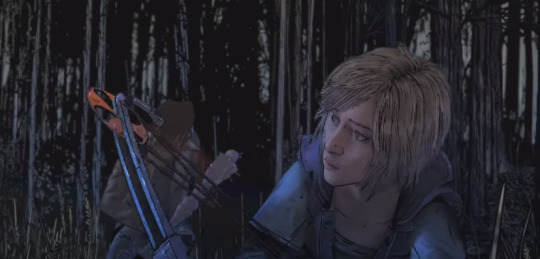
--only Louis manages to get hit.
Soooo.... I guess the buckshot swerves around and above Violet to ONLY hit Louis? Like, I know she ducks a bit but I still feel like something should’ve nicked her as well?? At least?? Like, are lesbians immune to shotguns and that’s why nothing hit Violet?? Am I only learning this now??
Not only that, but it only got Louis in the arm?? H-how??
But that’s not all!
After Louis and Violet flee the scene, Clementine and AJ are on the run with Lilly and Abel shooting BEHIND them... sooo...

If Abel was behind them.... how is it that AJ’s shot in the FRONT of his stomach??
Like, I guess Abel could’ve been at an angle when he shot but they only ever show him behind them soo?? Do I just not know how shotguns work? Do they curve to hit people in their front rather than shooting straight forward?? Because what??
On top of that, how is AJ not dead?? I know, I know, protagonist powers and whatnot but?? the boy took a shotgun to the belly?? other characters have survived lesser things??
But y’know, the dumbest part about this is the fact that I can’t take Abel’s magic shotgun for myself after the Ericson crew capture him. I could’ve just finished off every delta member if the shots curve and travel to hit their targets.
Or maybe Abel’s the only one who can harness its power.
Either way, Abel’s dumb shotgun is dumb.
3.You can’t hug Louis and Violet during their romance routes.
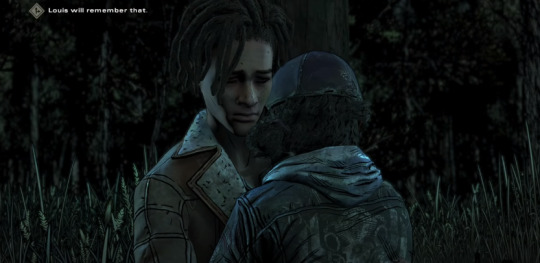
Sigh.... Why?
Y’all know that I’m a clouis shipper, and now lemme tell you a fun story that isn’t actually that fun-- Do you remember when the trailer dropped for ep3? And we got some teaser screenshots, with one of them being a shot of Clementine and Louis hugging? Well, I was excited for a plethora of reasons, and that hug?
I could not wait for this hug.
Then I got through my first run of ep3 and... no hug? Wait, no hug? Why not? I thought--
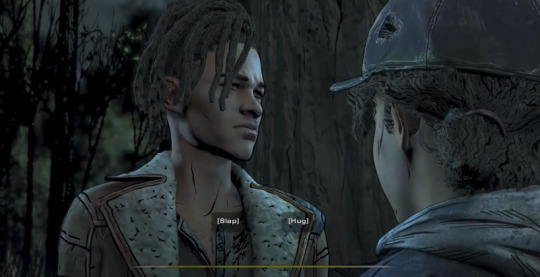
Oh. Oh, it turns out... it turns out you can only hug Louis if you don’t romance him.
Ummmm. Huh. Wha- why?? Do you know how dumb that is?? What dingus who worked on this episode forgot to implement the hug option for the romance route?? Rather, what dingus thought it was a good idea to only give the Louis romance two options outside of doing nothing-- Slap Louis, or kiss him?? Where’s my hug?? Why is Clementine not allowed to comfort her boyfriend with a hug when he’s clearly anxious about everything that’s about to go down?
Look, the smooch is great and all BUT it’s not what Louis needs in this moment, ya dingus.
I’m sure if I asked Kent for answers about this, he’d do one of two things-- go into a long winded essay about how the lack of hug and slapping him totally makes sense within the context of Louis’ character arc and route because of this and that and this subtle detail here... or he’d give a shrug and say “I dunno, reasons??”
Ugh, okay, well maybe they let you have the choice in Violet’s romance route--

...Why??
Again, if I choose to romance Violet, why am I not allowed to comfort my girlfriend with a hug before we do this rescue mission?? Sure, I can reassure her that I’m not going anywhere, which is definitely a better option for a love interest than, oh I don’t know, slapping. But the HUG!
They could’ve implemented the hug option into the romance routes but they didn’t and that’s incredibly dumb.
2. Magic tree is magic.
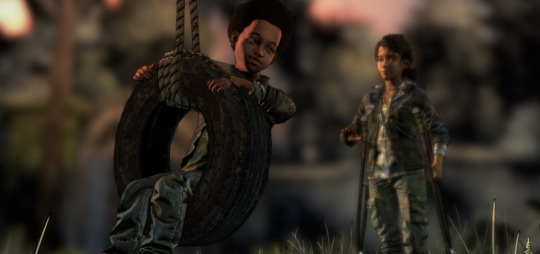
Know what I don’t like? The dream theory. Y’know, the theory that the overly happy ending we got at the end of TFS was all just a dream in AJ’s head to cope with the devastation of the real ending-- the one where Clementine died.
Now, I can already hear you scoffing at me once more like, “Dream theories are dumb, CJ.” and this time, I do agree with you.
However, there’s actually some compelling evidence that could subtly point at this theory, such as the backward graffiti in the dorms that was present in Clementine’s nightmare, or the fact that Clementine is, y’know, alive despite being seconds away from death in the barn...
Oh, and then there’s this fucking magic tree.
Oh, you know... the tree that magically grows in in ep4! The one with the tire swing!

Episode 3 vs Episode 4
This tree is dumb and makes no sense. What, did they just... plant a tree there? Did they push the tree up that was on the ground and use some magical wood glue to fix it?? Clementine said that Willy helped her with the tire swing so like... is Willy some sort of tree whisperer??
Or is this just further evidence of the dream theory where AJ’s lamenting the fact that Clementine never got to push him on the tire swing back at the train station and now she never will because she’s fucking dead??
I don’t wanna think about it. In fact, I’m pretty sure that’s what the devs would tell me-- “Shhhh... don’t think about it.”
This tree is dumb!
1. What even is the greenhouse??
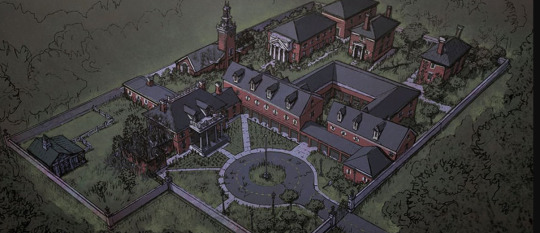
So.... the green house. It’s dumb. And inconsistent, both in the story and actual location of it.
First of all, as you can see in the concept image above, it should be within the walls of Ericson, yeah? And if you’re like, “Well, it’s CONCEPT art so it might not be totally accurate CJ.” and I say, “Fair enough, let’s look that the actual in-game map the characters use then.”
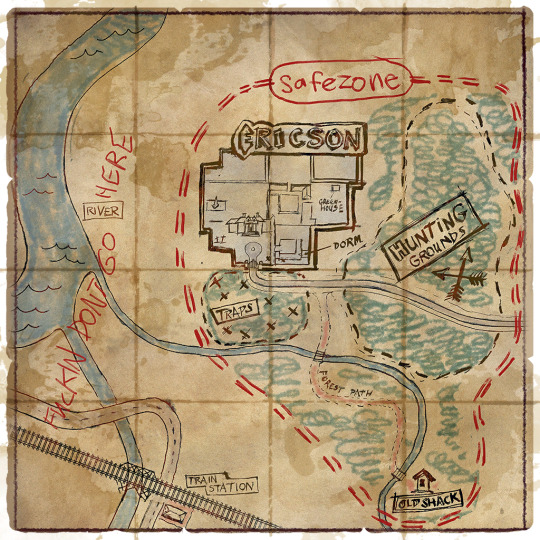
Look at that-- still within the walls of Ericson, though in a different location than the concept art. Make sense? Sooo....
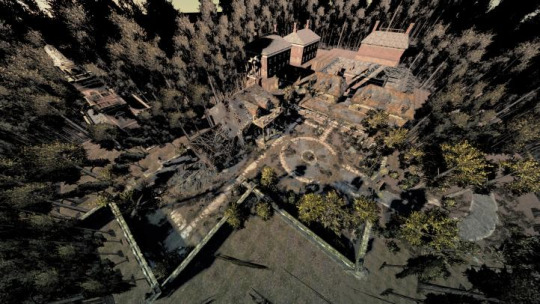
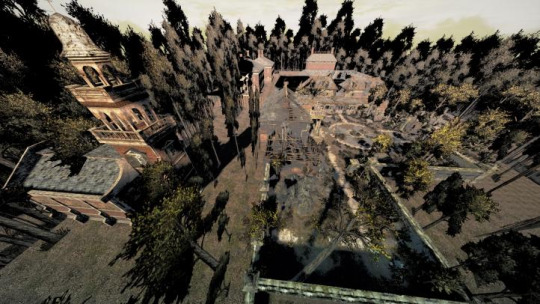
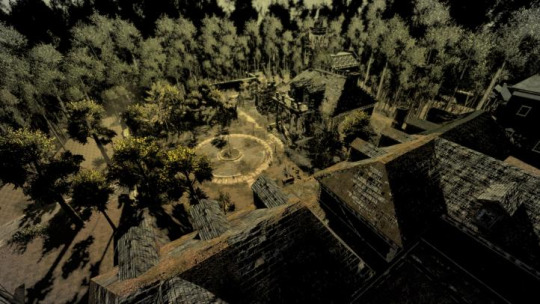
Where the hell is it?
Because it’s not within Ericson’s walls. No, no--
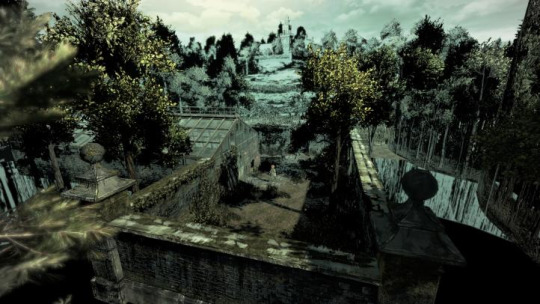
It is WAAAAY the hell out here! You can see the bell tower in the distance so like... huh? Where are we?? This is a long as walk to the greenhouse!
Oh, and if the weird inconsistent locations weren’t dumb enough, there are different conflicting stories surrounding it, as well!
First, Marlon says that they had it functional with lots of vegetables, but then it became over grown so they don’t go out there anymore. Then, if you go fishing with Violet and Brody, Vi will tell you she worked in the greenhouse the day the twins were killed last year, which... doesn’t add up? Especially when we actually go there in ep2 and see that Ms. Martin died and became a walker inside, but she died a while ago??
Also, how did Ms. Martin get tied up like that? Did she get bit, barricade the doors-- wait, that doesn’t work because how did she barricade the science lab from the inside when there’s a shelf in front of the door?? In fact, shouldn’t the walkers that are inside be students that died??
“Sshhhh... don’t think about it.”
Ugh, nothing adds up about this greenhouse and that makes it the dumbest thing in TFS.
---
Honorable Mentions
AJ magically teleporting behind Marlon with the gun. Because plot.
The dumb padlock on the gate Louis/Violet/Tenn climb over in ep4 that they could’ve easily broken
Louis’ jacket that somehow holds Chairles
The padding on Violet’s boot that’s rendered useless because they put it on the leg she doesn’t use to kick walkers away
---
Those are my Top 5 dumbest things in TFS, do you agree or disagree? Do you have anything from this game that’s dumber than what I have listed? Let me know!
Next week’s T5F Top 5 Characters in ANF Who Would’ve Made Better Love Interests Than Kate
#twdg t5f#twdg#twdg clementine#twdg aj#twdg louis#twdg violet#twdg lilly#twdg abel#twdg marlon#twdg aasim#twdg mitch#twdg tfs
30 notes
·
View notes
Text
“Clarice” Liveblog: Episode 2
Again, some extremely unfashionably late hot takes.
(Special thanks to @kathrynethegreat and @special-agent-pendragon for encouraging another liveblog!)
Clarice is working out! And eating junk food! I love it.
and cleaning her gun!
hey, Ardelia is drinking what I’m going to assume is her grandmother’s “smart people tea”.
Krendler disciplining Clarice already is infuriating but appropriate.
“I lost control.” Oh no, I don’t like that. Don’t make Clarice unstable. Her mental and emotional state never had anything to do with her failing career.
getting weird mixed signals from Ardelia. Last week, she obviously didn’t want Clarice to lie/stick to the script Krendler gave her, but now she’s telling Clarice she messed up by not doing so...?
“I better know you if you’re calling this early.” Amen, Ardelia.
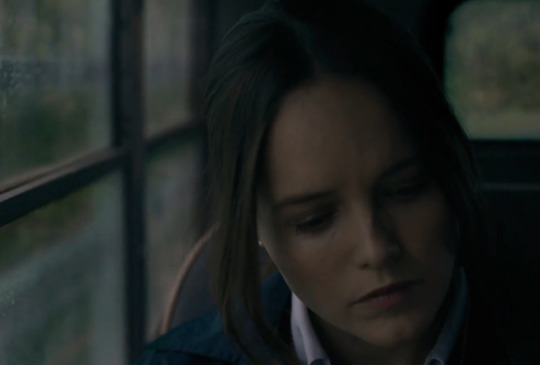

I’m in love: this cinematography is straight out of the film (when she’s flying to WV with Crawford)!
“When’s the last time you went back to Appalachia?” “It’s been years.” What??? It has NOT been years--Clarice was JUST in West Virginia last week as well as in Silence, and she arguably attended college there as well. (UVA is at least nestled in the mountains, and you don’t have to drive far outside the Albemarle Valley to hit Appalachia proper.) After all the details about her character they’ve been nailing, they miss this glaring error?
I like the tiny details she’s noticing (like the guy biting his nails). Not only because she’s an investigator, but because it’s reminiscent of Hannibal’s influence (imo).

Clarice Is Short: The Saga continues
still not getting any creepy vibes off Krendler. He’s going to be much less effective as an antagonist if he isn’t lewd as well as a dick.
I really don’t care for the way the opening “credits” fade out from the death’s-head moth to Clarice’s face. There are MANY animals that represent her, or parts of her, in the books--lions, lambs, horses, and of course birds--so this choice feels empty and lazy to me.
also lazy: having a fellow agent straight-up tell her in episode 2 “you shouldn’t be in the Bureau.” Maybe in two or three years, after some further “Death Angel”-type incidents, I could see this blatant rudeness, but not yet.
“Reesey”? Thanks, I hate it.
this flashback must be of Clarice’s little brother. That answers one question I had last week. That said...Clarice’s brother doesn’t play the same role in her story that Mischa does in Hannibal’s--but this sure feels like a Mischa-esque flashback.
good: they’re finally getting to the source of Clarice’s actual trauma!
bad: this is NOT how Clarice found out about her father. In fact, that whole incident is laid out in detail in the novels, and there’s nothing overly literary/un-cinematic about it, so this feels unnecessary. “The police are here! Something happened to Daddy!” No, bad! Show, don’t tell!
she would’ve known better than to introduce herself to that kid as “Clarice Starling, FBI,” come on now.
were they regularly able to wire tap hair clips in 1993?
actually, nothing in this show looks very 90s to me so far. I’m sad about it.
so in eighteen months, Ruth Martin has gone from a junior Senator to the Attorney freakin’ General, and now she might run for governor?? At least let her get settled in one position of power first, why don’t you!
yet more Buffalo Bill flashbacks...alas.
are they trying to make this guy another surrogate Hannibal character? He’s commenting on Clarice’s accent and the dryness of her skin, asking about who she “left behind”...it all feels very Hannibal. (I know he’s a Charismatic Cult Leader trope, too--but when played off of Clarice...)
“Ew.” “I hate this guy.” I laughed.
I understand that Clarice probably feels conflicted re: her siblings in the book, but I’m really not digging the flashbacks of this Tim Burton character her brother.
@ the writers: Clarice already has the lamb backstory/symbolism, too. We don’t need this Little Brother stuff.
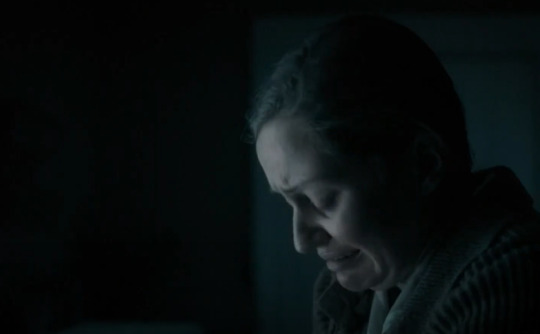
*shrieking* Mrs. Starling! At the sink washing the blood out of his hat!!!
...aaand they had to ruin it with the brother’s painfully bad dialogue. Will still be good for gif-making, though.
are we supposed to interpret all these flashbacks as Clarice being incapable of controlling her emotions/state of mind? She keeps losing herself in memories and emerging all doe-eyed and panicky. I don’t like it.
not to be a broken record but...Clarice should be TOUGH. Again, Ardelia only saw her cry once in seven years. But she’s more worked up in this scene than Jodie was in Memphis!
when Mr. Cult Leader shouts “Agent Starling! Agent Starling!” he sounds exactly like Hannibal calling her back to his cell in the asylum. That has to be intentional.
damn, wish that I could look as good five minutes after I’ve been crying as Clarice does.
I LOVE that Ardelia gets to be the crucial behind-the-scenes book-smart partner to Clarice’s action heroine.
AG Martin’s just playing politics by turning a blind eye to the crooked sheriff. But when her own daughter was just kidnapped and almost killed, she looks like a real hypocrite.
gosh, Rebecca Breeds is great. I already hope she gets nominated for an Emmy.
so Krendler is...doing the right thing???
Clarice’s father was definitely not a sheriff. I hope she’s just exaggerating for dramatic effect. (Maybe this will be clarified later.)
she couldn’t just sit with a manipulative guy without getting emotional, but she’s cool as a cucumber while telling an extended story about her father? HmmMM.
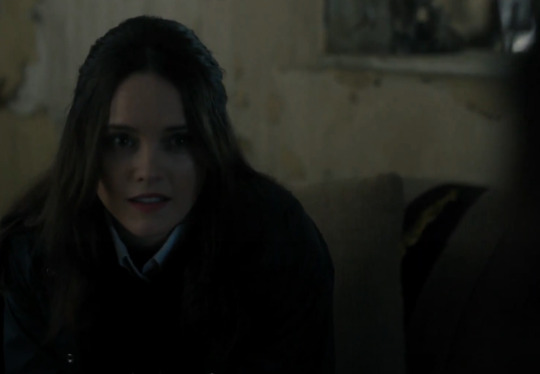
sometimes her mannerisms and facial expressions are so much like Jodie’s that it’s uncanny, like here when she leans forward to confront the Cult Leader.
“She did it.” Damn straight!

another great callback to Silence. this show’s camera crew knows its stuff!
“He’s concerned I have some residual trauma from Bill.” I. Hate. This. Subplot--and all its OOC implications.
“Catherine was close to her father, too.” Ooh, a nice allusion to the novel! Clarice makes note of their “common wound,” the loss of a father, when she’s in Catherine’s apartment in Silence.
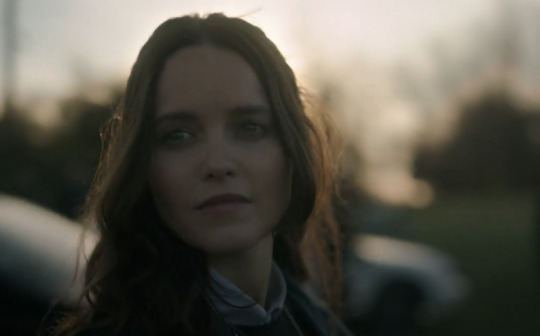
she is just SO pretty.
little Clarice looks a LOT like Rebecca Breeds. I hope we see some more of her.
The Good:
the continuing visual nods to the Silence film via cinematography
Mama Starling!!!
Clarice’s “The World Will Not Be This Way Within the Reach of my Arm” attitude, refusing to leave without helping the victims.
Ardelia Mapp coming in clutch!
Clarice being, generally, a badass
and using psychological tricks/mind games to pin the antagonist...that’s the woman who disarmed a monster with just a few words.
Rebecca Breed’s acting has been phenomenal so far.
I like Clarice’s haircut a lot better when worn down (though it’s not very practical for fieldwork, so we probably won’t see it much).
The Bad:
the continuing Buffalo Bill-related Trauma Subplot. Ugh.
all the flashbacks to Clarice’s brother (and the not-so-subtle suggestion that her brother is, symbolically, another lamb).
will the real Paul Krendler please come forward? this guy is so TAME.
the other agents’ hostility towards Clarice needs to be toned down slightly so that it can escalate. Otherwise, where’s the tension?
is this actually 1993? I’m not feeling it. Shouldn’t it have a little of that Season 1/2 X-Files aesthetic? Please give me more than once-an-episode references to pagers and fax machines!
that glaring Appalachia continuity error...it’s still bugging me.
I missed the overt Hannibal references, even though they’re not necessary to any part of this episode. A lady can dream!
Overall, I really liked this one despite my various issues with it. It started shakily but built to a great finish. The emphasis across both episodes on Clarice being in the FBI not just to “get out, get anywhere,” but out of a genuine desire to help victims has been wonderful. I just hope they don’t swerve too far into the “too traumatized and emotionally compromised to function” lane. It would be a disservice to Clarice’s character and to her journey (and would smack too much of “Hannibal really did prey on her weak mind/brainwash her”.
Things I’d still like to see: More of her personality. Her hobbies and interests. That she’s cleaning her gun is great! Now let’s see “Poison Oakley” practicing her sharpshooting skills. Or car shopping. Or clothes shopping to show off her “developing taste.” (Ardelia can come!) I’ll take literally anything. Give us more of Clarice’s sense of humor as well. She had some subtle funny moments in the pilot, and it’s nice to see Rebecca smile for a change.
And Krendler? Smear that man in grease! I appreciated a happy ending even though Clarice’s career is, as we know, already in a downward spiral--the last thing we want is for every episode to be a slog, especially when a good chunk of the audience hasn’t read the book and doesn’t know Clarice is doomed to fail in the Bureau.
However... Krendler’s not a “redemption arc” kind of character. Or even a “run-of-the-mill sexist asshole” character. This is a man who spent seven years systematically sabotaging a young woman’s career because a) he was jealous that she solved the Gumb case before him, and b) she wouldn’t fuck him. He was a Justice Department official working fist-in-glove with a serial child molester who was planning some of the heinous vigilante justice imaginable. THAT’S why his very gruesome end at Hannibal’s hands felt deserved--even Clarice thought so! In short, he needs to get nasty.
Anyway, thanks for coming to another long-overdue TedTalk. Fingers crossed that the next one will be more timely (aiming for Sunday night)!
#Clarice Starling#clarice#cbs clarice#rebecca breeds#once again I apologize for how late this is#and how long and somewhat ranty lol#please let me know if you want more ♥♥♥#media [cbs show]#char [clarice starling]
21 notes
·
View notes
Note
I was just catching up with your blog, and I saw your klonnie post. It just got me thinking about how literally anyone in the narrative would have been more logical to pair Klaus up with than Caroline. I’ve read all your posts regarding why Klaroline does not make sense. 100% agree. I feel like Caroline is just who they went with because committing to a real Klaus love story would have taken way more time than the show had, and Caroline was the one who had the least commitments elsewhere in the narrative. I mean, there are plenty of plot heavy episodes where Caroline just disappears for no reason, and it’s obvious that the writers just didn’t have anywhere to logically put her. I honestly believed during my first watch through that Klaroline was just Klaus trying to put Tyler in his place. He never interacted with her before the episode where Tyler challenges his authority and refuses to bite Caroline, and then after that episode, he was being ooc and fake charming with her. I just thought Klaus was trying to get her to sleep with him so he could show Tyler that he was the one in charge and could take anything he had. Color me surprised when that was never the case.
Anyway, this all got me thinking about what individual arcs Caroline got, and I can’t really think of one after her becoming a vampire and getting tortured by her dad. After that, the show kind of played “pass the Caroline.” She would get passed around during episodes where she was either tagging along with Stefan, Tyler, or Klaus. Obviously it’s okay for your characters to be in scenes with each other, but the problem is you could take Caroline out of the season 4 sire-bound breaking storyline or the delena ft. sad Stefan storyline and nothing would really change. She is really on par with Jeremy and Matt in which she could just leave for a while and make a reappearance later like nothing happened; however, unlike Jeremy and Matt, she isn’t treated this way in the narrative. Caroline is made out to be more important than she is. I didn’t realize how long this ask would be, but if you could change the story structure of TVD to fix this, how would you do it? Would you have written Caroline to have more individual storylines or would you have decreased her role? Maybe it’s just me and you would keep her the same. Idk. Either way, I’m very interested in your opinion. Especially because Caroline is the more utilized and loved character throughout this fandom and fanfiction, and I don’t know why.
first of all “catching up with your blog” what kajfklajdfklajdf
sorry it’s taken me a few days to reply, I’ve been mulling this over and it’s been kind of a long week so I’ve had to gather the bandwidth to answer
I agree with your analysis about why the show chose Caroline as Klaus’s love interest... I’ve always said that it was just so painfully obvious that they wanted to give Klaus a love interest from amongst the heroines (which: rude, he already had a love interest, it was Stefan) because he was interesting and hot. And I always assumed they picked Caroline because 1) Elena already had too many love interests even though she and Klaus had history and wicked chemistry so this still to me remains the obvious choice 2) Bonnie would have actually had moral problems with Klaus (but would still have been a great choice because then we could explore those morality issues with Klaus) and 3) they wanted to do another “bad boy” romance without actually digging into the fact that Klaus had crossed lines for us as an audience that were SUPER hard to come back from, namely: MURDERING MAIN CAST MEMBER JENNA. (I would argue that this is different for us as an audience than Vicki’s death because Vicki died at the beginning of the show; our emotional investment in Jenna was significantly higher after 2 full seasons with her.) So, Caroline becomes the path of least resistance because Klaus has no serious, personal history with her, and she’s not as prone toward actually making moral judgment calls as Bonnie is-- for example, she’s shown to be significantly more flexible about murder and mayhem than Bonnie is.
I’ve never thought about the fact that it was partially just that the writers didn’t have any great ideas for Caroline’s personal storyline though, and that really brings up 2 huge questions: 1) DID they assign her the Klaus romance because they didn’t know what else to do with her? and 2) did that romance storyline actually deprive her of other (better) storylines?
This got me thinking about Caroline’s storylines in a broader sense, and her place within the narrative structure. I think of TVD as having 3 types of main characters:
A-level characters-- Elena, Stefan, and Damon are the only A-levels, as they appear in every single episode and the plot falls apart without them
B-level characters-- Bonnie, Caroline, and then later Klaus would all fit in here-- characters that are in most episodes, and have their own independent side plots that are ongoing, sometimes for long periods of time -- we know they’re B-level and not A-level because sometimes they disappear for a few episodes-- in other words, they’re not essential every episode like the A-levels
C-level characters-- the rest of the main cast-- Tyler, Matt, Jeremy, Jenna, Katherine, Rebekah, etc-- these characters sometimes have ongoing plotlines (the werewolf plot, the Hunter plot, the serial killer plot, etc) but they’re literally dispensable to the overall plot-- the writers feel comfortable having them come and go as necessary, and we often experience them through the perceptions of the higher-leveled characters--they tend to actually be the object of higher level plots as well-- Damon kills Jeremy to move his plot along with Elena; Matt scheming against Caroline’s vampirism is actually part of Caro’s plot; Katherine is mostly a narrative tool to use with the main 3; Jenna’s death isn’t even about her at the end of the day from a narrative perspective but about Elena, etc.
So when thinking of the basic structure in this sense, that issue you brought up where Caroline doesn’t have enough of her own storylines really comes to light. Part of that I think is that functionally, she has less to offer-- Bonnie is a great counter point, because she often has her own storylines, and she serves a super strong narrative purpose of 1) witch and 2) the moral center on the show-- like, usually the only one who doesn’t forget what’s right and what’s wrong from a basic human perspective. Klaus also has his function as villain, though he gets derailed by the show not killing him off when it was time.
Caroline meanwhile... the show probably took her as far as they could with her being human, and turning her into a vampire in season 2 was incredibly strong and compelling storytelling. It brought Caroline into the main fold of schemers, it gave her agency, and it put all of her problems with her family and friends and self-esteem under a microscope lens. Season 2 is Caroline’s strongest season because it offers her the most development and gives her both a functional role as baby vampire-- working for Katherine, working with the gang, trying to keep the big secret from her mother-- as well as a satisfying emotional arc. The issue is that she just doesn’t have a ton of places to go as a character once the issues with her parents are resolved midway through season 3 and a lot of her self-esteem issues had actually been tackled... The only other storyline I can think of that was HERS was her mother’s death, but I never finished that arc and never got to no humanity!Caroline anyway, so I don’t have much to say on that topic. I will say that the show REALLY drove Caroline’s storyline into the dirt when they turned Elena into a vampire-- having two baby vamps on the show was WAY too many. We’d already gone through this with Care, but also, Elena is an A-level character-- anything she goes through necessarily usurps the power from any similar story the writers could have told about Caroline.
So. The Klauroline romance. (Apparently I’ve been mispelling this ship for a decade but honestly you can’t expect me to stop now.) I think they gave Caroline to Klaus (rather than giving Klaus to Caroline) as a love interest for the reasons stated above, but it really did limit her character; I’ve gone over my problems with it ad nauseam here on this blog. The whole thing just spun Caroline around in circles forever-- I remember dreading that this ship would be canon but the show just kept spinning the Klaus/Caroline/Tyler wheels for two seasons without ever really progressing anything or changing anything, just always always always spinning in place, with Tyler disappearing to make room for the other ship but the writers also not actually committing to anything... It really does get in the way of Caroline’s character development.
So, how to fix?
Well, first off, I think Caroline (and Bonnie, and Klaus, and everyone else) should stay in their lanes as B or C level characters-- the show didn’t have enough stories to give every single one of them main character status, and that’s okay.
But if Caroline is a B-level character, she still needs her own stories and subplots interwoven throughout the show.
The obvious thing that comes to mind is something I’ve said many times-- Fix Klauroline so that it actually makes sense and doesn’t break character-- give them a subplot where they have to work together and learn to rely on each other or see each other differently than how they expect-- literally TVD is amazing with tight, action packed episodes-- it would have taken ONE episode to establish this, and then have the relationship progress as a subplot-- not as Caroline’s main plot-- give her other things to work on with the team and let the Klaus thing develop alongside it.
Other things: the issues with her parents probably could have been extended to be season 3, honestly, with her facing her vampirism more in season 2-- or she could have gone off the deep end earlier, or she could have wound up in trouble with the council, or she could have taken a more active role in trying to kill Klaus other than just “bait” which would have been great because then she would have had to face her feelings about it directly, or she could have been the one to investigate the vampire lab at Whitmore and maybe end up briefly imprisoned or whatever-- I personally think Elena should have only been a vampire for one season, which would have made Elena actually face her moral crisis, but also opened up the space in the show for Caroline to get the young vampire storylines the way that Bonnie gets the witch storylines.
The show gets into this weird habit at some point of forgetting that it’s really about the main three and not supposed to be a HUGE equal ensemble show-- if you look back at the promotional materials, it was originally always the three of the main triangle, but by seasons 5 & 6 there’re these photos with like all dozen cast members... equalizing things didn’t actually help Caroline’s or Bonnie’s or anyone else’s storylines because it stripped down the time we spent with the main story and it meant adding a lot of frustrating swimming in circles for the others (how many times was Bonnie dead? I can’t keep track anymore)
Sorry this is so rambly, I hope it made sense! I have a lot of feelings about Caroline-- I really loved her and the handling of her storylines from season 3 on has never sat well with me.
(As for why Caroline is the fan favorite, I do have a theory: she actually tells us what she’s thinking and feeling, so it’s easier to connect with her. Elena meanwhile rarely ever explicitly states her emotions, instead tending to brood and force us to work through what her silences mean, and Bonnie tends to bottle until she explodes--which is still easier to empathize with than Elena, because at least Bonnie eventually tells us. Meanwhile, Caroline gets upset, or she gets drunk, or she has long conversations where she spills her heart out to Stefan or Elena or Bonnie or anyone... so it’s easy to jump on board with her. That’s my theory at least.)
15 notes
·
View notes
Note
1/2 That Twitter essay about Hordak feels horrendously disingenuous, as you said, and it showcases a lot of what people misinterpret about Hordak. They still think of him as the big bad, instead a fellow abuse victim turned abuse enabler. They see Hordak as the dad to Shadow Weaver's mom, which, is complex and kinda reductive. As said many times, Hordak didn't even know Catra existed before mid-season 1, so why is it that people keep assuming he's her abuser? Because Shadow Weaver turned "good"?
2/2 Part of the misinterpretation honestly requires turning a huge blind eye to Shadow Weaver. They have a ready made abuser right in front of them, but they choose to go with the person that's a large parallel to Catra's own abuse story instead. Going into wild theory territory, they might be shifting any grievances they have around Catra, around how she enjoys hurting the princesses and adora throughout the show, onto Hordak, imagining him with the same sadistic joy he never shows.
I do sometimes wonder if, perhaps, part of the reason some fans seem to have issue with fully accepting the things that Catra does is that they project themselves onto her very strongly, and it is hard for them to both identify with her and acknowledge that she did some Very Bad Things that cannot be assessed as purely due to abuse. I wonder if they don’t like the possibility of seeing that sort of behavior within themselves, through her? But I don’t know; I obviously don’t know any of these people personally, so. Hm.
Now, in terms of Hordak specifically: I feel like people need to realize that his storyline is very much removed from Catra’s in terms of affecting her. Like... he’s not Shadow Weaver, whose arc intimately involves both Catra and Adora and alters their pathways in intentional manners. He’s not one of the foundations of her situation. Rather, he actually functions as one of the results of her arc (kind of like Scorpia and others whom Catra abuses and/or drives away: he is proof of her downfall, rather than cause).
This is not the “usual” arrangement of things; in most shows, I do think a character like Hordak would function as one of the foundational causes that compels Catra into her patterns of behavior. SPoP, however, is different. It marks Hordak as his own character with his own very serious problems -- compare this to Shadow Weaver, who doesn’t really grow, doesn’t learn, and doesn’t really have a transformative arc of her own. Most of what involves her functions to alters the paths of Catra and Adora. Hordak, on the other hand, has his own personal arc that has little to nothing to do with our main characters; his actions and issues are generally separate from them both physically and emotionally.
Think, for example, about how Adora and Catra react to SW’s death: clearly, this character means something to them very personally. Nothing to this level happens between them and Hordak (though the scene with him and Adora is it’s own special experience, but I think it has a different message and a different feeling to it). Think also to the plain fear Catra shows when Shadow Weaver threatens her multiple times in season one, while in season two, after Hordak asphyxiates her, she goes right back to speaking to him with confidence and appears annoyed, not scared, upon leaving the room.
The relationships are just not the same. Hordak just doesn’t have that sort of function for Catra. His personal arc is its own standalone thing, and he’s more of a victim of Catra’s actions during the course of the series, rather than a real cause.
But, well... people will project as they wish to project.
24 notes
·
View notes
Text
moral dilemmas and greater good mentality: so…what now? (aka me yelling about one specific panel in bnha 292 and definitely jumping the gun on aftermath talks)
so 292 happened.
and a lot happened. one miraculous return to another. injuries. and some battlefield conversations. and there’s a lot we could talk about in regards to what might happen in 293 or 294 or anything coming up next since this battle is still very much up in the air.
but one panel had me screaming and i want to talk about it. and since none of my irl fans are able to yell about it with me: tumblr void here i come!
so reading through bnha 292 i had a lot of thoughts. “where’s endeavour?”, “POWER!”, “NOT HADO”, “way to go midoriya for acknowledging todoroki’s current suffering on this terrible no good day that just won’t end”, and more! but there’s one panel that kind of brought up something that i have been thinking about in vague terms since 290 with the reveal. so i’m using this as an excuse to think about it in less vague terms.
the panel in question?
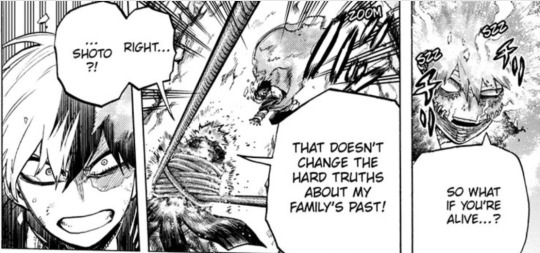
and why do i like this panel so much that i’m writing a tumblr essay about it?
it’s kind of the first glimpse we get at what could be very prominent in the fallout of this reveal. with best jeanist not dead, and as we know - hawk’s having a recording of the twice fight - dabi’s narrative is falling apart a bit. and if the public finds out that the stuff about hawks wasn’t necessarily completely true — they may be willing, and want, to question if the situation with endeavour is true. after all, why should they believe a villain?
but as best jeanist arrival begins to point out that fact, dabi isn’t concerned. after all, his story about endeavour is true - right shouto?
and here’s the thing, this very well could come down largely to what shouto has to say - what all the todoroki’s have to say post-war. the public is going to turn to the todoroki family to tell them it’s not true. and the todorokis — all of them — are going to have to decide how they will answer that question.
now my forewarning here, is this is pretty much baseless theorizing. it’s just something i find interesting and i’d love if the story explored it. nonetheless: whether the story will or not, i’m going to explore it.
say this fight ends as it is, with no more major casualties or reveals happening. the public is left with dabi’s reveals, destruction and wavering faith in heroes — but turns out best jeanist is alive, and i’m going to assuming hawks’ recording is released.
maybe the villain was lying. maybe hero society isn’t as corrupt as it seemed to be from the villain’s video. so what’s the next step?
statements from the todoroki’s.
first and foremost enji, the number one himself. so does enji deny everything? admit to some of it, but claim dabi was over exaggerating? or admit that the villain was telling the truth? and right off the bat, narratively speaking this puts us in a major moral conundrum.
because as a father — enji todoroki, who is seeking atonement for his actions, has an obligation to do what’s best by his family. by as the number one hero — endeavour, who just recently earned this position in the eyes of the public, has an obligation to the public and hero society to protect them. the pro-hero arc went out of its way to show us exactly what the stakes are on both sides.
and throughout this entire story enji has demonstrated extreme difficulty being able to separate being a father with his aspirations of being the number one hero. and while he has been trying to atone, this will be his first major decision to see if he has really changed.
but it’s more complicated than that. because layered into this: choosing his family would, in a lot of ways, mean choosing against the general public — who desperately needs stability and to be told it’s not true, lie or not.
if endeavour goes down for this, it means that arguably at this point in the story: the villains have won. the public lacks the stability all might built with no one really to replace him (which is a whole other conversation about how that might go down and what the hero commission and agencies might try to prevent that). the public doesn’t trust their heroes. hero society as we know it, is falling apart (whether that’s necessarily a bad thing in the long run is debatable but in the short term it is very bad if it goes down this way)
but it isn’t only enji’s choice: there’s four other members of the todoroki family to consider — and what they want should be a big factor in his decision.
but what would they want?
the family, while not necessarily functional, was steadily improving. fuyumi, natsuo and shouto all spending more time together. rei making colossal improvements. and while sure, that does not in no way erase the suffering they went through, at large the family was choosing to deal with it privately. even natsuo, who was the most against enji out of the bunch.
but now that choice has been taken from them, which say what you want about dabi, is probably one of the worst parts about this reveal.
so will fuyumi want to try and bury the damage, deny these claims and try and move on as normal, or will she want to try to minimize it? will she want to leave the choice up to other members of her family and do what’s best for them?
what will natsuo want to do? rei?
shouto?
and let’s talk about shouto for a minute here. because if anything, this puts shouto in an even greater massively difficult position.
not only is he the “main” one of the bunch, he has stakes in both worlds — his family and hero society. he also has very clearly acknowledged the fact that he hasn’t decided how he feels about endeavour seeking atonement yet and if he wants to forgive his father. in addition, shouto has said that as a hero he wants to be able to put people at ease.
does shouto distance himself from his father or stand by him as a hero? does he come out with his side of the story? what does he personally choose to do? because it affects his mental and emotional wellbeing, but it also affects his prospects as a hero. already he’s dealing with so much, and if the world looks to him to confirm or deny his brother’s claims, as dabi just did (albeit in that case probably tauntingly) — what will he choose to do?
and if this is the direction things take, this is a huge deal that i think shouto will play a critical part in deciding the outcome of. and it’s an awful heart-breaking decision but on a narrative level brings up some of my favourite character moments.
where characters are forced to choose between their morals, and ideals, choose what they feel like is right — but ultimately there are no good options. no way to get out without compromising something important regardless.
it’s those moments that we really get to see what is most important to a character. right now, it’s the choice of the family or the public. the choice of do we lie and hide our suffering, to put the general public at ease — to make them feel better. and by their professions endeavour and shouto both have obligations to the public. but natsuo, fuyumi and rei don’t.
is it fair to ask them to lie or downplay the truth “for the greater good”?
and i have no idea how everything would play out if this happened. if all the todorokis spoke out and denied dabi’s accusations would it be enough to convince the public to still place their trust in endeavour? if they acknowledge the accusations as true — where does it put them, where does it put shouto’s future hero career? can they find a middle ground and try to minimize damage on all sides?
and arguably, is preserving hero society the right choice? is it better to bring it down and try and build it back up? or is it too much to fast?
nothing is clear cut here.
and more than anything else i love when stories force it’s characters to pick between their own needs and the good of the public. if i may take from another franchise: it’s the age-old question, do “the needs of the many, outweigh the needs of the few”?
should they tear endeavour down — an action that despite at long last revealing the truth, will probably cause tension within the family because that isn’t universally what the whole family wants?
because that’s the component on the smaller scale: the needs and wants within the todoroki family itself. no matter what — someone in the family is probably going to have to give up their ideals. because the key right now is that the remaining todorokis (meaning fuyumi, natsuo, rei and shouto) kind of have to present a united front. an agreement on what happened to present to the public. or else not only would tensions continue to grow between the family itself (although unfortunately this may happen regardless) but also probably confuse and sow chaos into the public because it would become apparent that someone is lying — not necessarily just the villain.
it’s a really complicated moral situation. and i’d be beyond excited (read prepared to get my heartbroken) to find out. as a writer myself, these are the moments that really determine who a character is. and i’m very excited to find out how the todorokis will respond to all eyes suddenly being on them and their private lives.
anyway that’s all i’ve got. these is really less of a theory and more of just yelling about what if’s and moral dilemmas because these are my favourite moments in narrative.
(small disclaimer as well: obviously this is a very serious situation and its absolutely heart-breaking that the kids + rei are being put in these types of potential situations. it should be simple — endeavour was awful. he was abusive. dabi wasn’t lying about that. but it’s not. because of society, because unfortunately in this story, it’s a lot bigger than just them and their family. endeavour is getting what was coming to him but in light of seeing his character move and change and the different depths, and the work the whole family has put in to try and be a family, the fact that this is how things are coming out, and the fact that this is so much farther reaching that simply did endeavour do it or not, is heart-wrenching. they don’t have a “right” choice at this point in time. no matter what it will either cost them, or the world something. and that’s awful. but its these moments that make this arc and the todoroki family so good and well executed. because it doesn’t shy away from touching on the fact that sometimes there aren’t right choices. that sometimes, especially in a world like bnha, you have to sacrifice something and its those devastating moments that make the story all the richer. when i say “im excited”, i’m excited to see the narrative consequence + feel the pain of what the characters are going through. narratives are powerful because they can make us feel things, so the fallout of this is exciting to me because i’m expecting to absolutely feel uncomfortable and upset and as distraught as the characters because that's what good stories do.)
#bnha 292#bnha spoilers#bnha manga spoilers#bnha manga#keeping up with the todorokis#todoroki enji#todoroki shouto#todofam#repost because my tumblr is messing up rip#anyway i'm still yelling
14 notes
·
View notes
Note
Why do you stan Emori so much? I’m someone who has never really grown to like her, so I genuinely just want to know. I find a lot of her characteristics already done in other characters, or wholly unlikeable. I truly can’t see how taking her out of the story would change much of anything - Murphy’s arc could be aided along by someone else easily. So: This is your chance to use CANON (a lot of pro-Emori stuff I see is headcanon) to explain to my why I should like Emori.
Hey, anon! Alright, just letting you know, you ASKED for a long answer haha. :)
First, I just want to say that Emori clicks with me, but if you don’t find her interesting or don’t connect with her, really no matter what I say, it’s probably not going to change your opinion and that’s totally fine! Some characters REALLY click with you and others just don’t for whatever reason. So I’m not necessarily going at this like “here’s why you SHOULD like Emori” but more “here is why I personally like Emori, whether you vibe with that or not”
I agree that you can take her out of the story without it changing much, but I’d also argue that’s really the case for MOST of The 100 cast, the Griffins and Blakes and some other key players aside. At its heart, The 100 really is an ensemble show. It’s about how this particular world and the societies and the fight for survival affects different people and how they respond to it and the struggle between different groups and different beliefs and different people.
The point of MOST of the characters existing in this series isn’t that they fulfill an important role in the plot, but that they each show a new perspective of what it means to live in the harsh, cruel world of the show. Obviously plot points are developed around these characters, but the truth is you could remove most of the supporting cast and rewrite plot points to work without them.
So the biggest thing that Emori does for the show isn’t that it can’t function on a plot level without her, but she adds a new, unique perspective of what it means to live in this world and society and be affected by it. Emori’s perspective IS unique to this show (aside from the smaller other mutated characters who introduce the concept of societal prejudices but don’t really get the room to develop or connect with the audience). She’s on the lowest ring of society. She’s an outcast not because of anything she’s done, but because of societal prejudices and hatred. She’s part of just yet another group out there fighting for survival in this world. Her mutation is also a direct result of the bombs and the lingering radiation, giving another example of how that setup has affected this world and the people in it. So while, yes, she could ultimately be removed from the show without breaking the plot, you lose that perspective and worldbuilding. You lose that additional example of how this world affects the people in it. You lose that story.
I like Emori because she’s interesting.
That’s really it. She’s a unique character. She has a unique backstory within the show compared to the other supporting characters. It was just FUN to get to know more about her and her life and how she has survived in this world.
Emori was born into a cruel world and immediately shown cruelty and hatred for something she couldn’t control. Her world labeled her worthless, her society rejected her, and Emori turned harsh and selfish and ruthless and mean in response. Emori has to fight, steal, and kill for every single scrap of survival because on one else thinks she deserves anything - even the right to live. The only reason Emori lived as long as she did was because SHE fought for herself and did anything she had to to survive.
I just think that makes such an interesting character and story. I just love watching how she approaches what happens to her and how she responds. I love that her world told her she’s worthless and deserved to die and Emori said fuck you, no I’m not, and fought to live anyways.
I feel like a lot of people who don’t like her say it’s because she’s mean or does bad things or isn’t a perfect saint or is a bad influence or whatever and I just want to be like YES, EXACTLY. I like that she’s flawed. I like that she’s so mistrusting of the world because she’s been burned that she looks out for herself and her two people and would screw over anyone she had to. It’s way more fun to have a character like that - who has believable, understandable reasons to be like that - than a character who only exists to be the Moral Voice of Reason or isn’t allowed to actually have flaws. (Like there is a reason that Rubicon and Gimme Shelter will forever be my favorite Emori episodes. She is ruthless!!! And brilliant!!! And she will kill a man to survive.)
I think broken characters who have painful pasts and unhealed emotional wounds and fears and make questionable or outright bad choices are so much more interesting to watch and so much easier to connect to because THAT’S the human experience, baby. I might not be killing and stealing and conning people, but I sure have insecurities and fears caused by past experiences and can understand that.
I love, love, love that Emori is a con artist! Like that’s the coolest thing ever!!! She’s a brilliant manipulator and she knows how to play people. In Rubicon, she takes advantage of the fact that she looks weak and pretty and small and plays the damsel in distress to con a group of men. In Gimme Shelter, she uses the fact that her past experiences and Clarke’s contrasting privilege make her feel guilty. She’s BRILLIANT! She can use a knife and she can fight, but the way she’s made it this far in the world is by using her brain. I love that!!
I love that she manipulates and cons the audience alongside Jaha’s Merry Band of Men in Rubicon. Like she gets introduced to both the audience and the characters as this damsel in distress victim who needs help and is so harmless and then just flips the switch on us!!! Pysch!!! It was a TRAP the whole time!! Like, that’s just so fun and badass?? I love it. I love her introduction into this series so much.
I love her early aesthetic. The blue dresses are nice but she comes into this series looking like a desert pirate bandit and that’s fucking fantastic and fun! I love it so much! I kind of miss it to be honest.
I love that she’s sassy and has a sense of humor despite how cruel the world has been to her. I love that she manages to find joy in things still. I love that she is loyal as HELL to the people she’s decided to care about and that finding acceptance and a place to belong in Spacekru allowed her to grow enough to care for an entire group of people and want to protect them.
Which speaking of, I love her journey through this series as a whole so much. She starts off so untrusting of other people and so unwilling to try to join community (she’s so against going to try and join Skaikru at first) and eventually she finds her place and learns to love her family so MUCH. She grows so much more open with people and so much more trusting and kind as the series goes on because she finds a place that accepts her for what she is and lets her belong and she cherishes it and it changes her so much. I loved her growth through s5 and later seasons, going from someone who trusted ONE PERSON in the world and would let everyone else burned because she was scared of them hurting her to being willing to give up immortality to save her family AND others.
And I relate so much to her story of self esteem and dealing with society’s views of you. I don’t have a disability, but that feeling of being told some part of you is flawed or undesirable is relatable, and it means SO MUCH to me that Emori was given the option to make her hand normal and she said, actually, I have no flaws. I am HAPPY with how I am and it is SOCIETY’S problem that they can’t accept it, not mine. That’s a POWERFUL moment.
Anyways, this started somewhat organized and devolved into me just listing all the things I love about Emori, but really the answer is just I think she’s interesting. I think she’s complicated and real and flawed and unique and relatable and she grows and changes in interesting ways. I think she offers a unique new perspective and story to the show. And I also just think Luisa is a fantastic actress who is so fun to watch.
If you don’t feel the same way, then, like I said, seeing why I find her a fascinating, fun character probably isn’t going to change your mind, but I love her so much and I’m so glad she got added to the show. Thanks for asking for my opinion though!
15 notes
·
View notes
Text
Jingle Jangle Review!
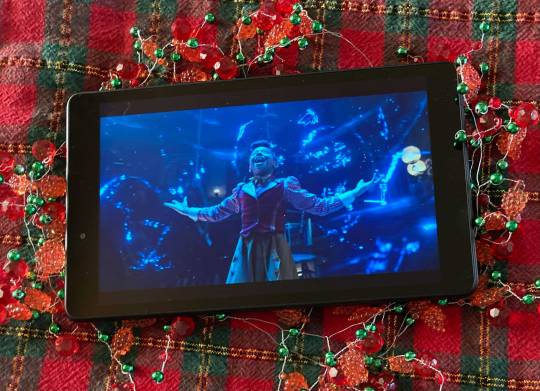
Jingle Jangle: A Christmas Journey David E. Talbert (2020) Netflix Original Movie Fantasy, Holiday, Musical, Children’s Movie
Rating: 5/5 Waves

“I think it’s time for a new story.” – Journey
This review CONTAINS spoilers for Jingle Jangle: A Christmas Journey
Summary: Jeronicus Jangle is a genius toymaker who has everything he’s ever wanted until betrayal and tragedy strike and rip away his magic and inspiration. Jingle Jangle follows his journey with his bright, spunky granddaughter to finding his way out of darkness and towards family, love and inspiration.
No content warnings apply for Jingle Jangle: A Christmas Journey
Last year was a mess and 2021 is already on thin ice, but one of the best things to happen to me this season was my girlfriend sitting me down and convincing me to watch Jingle Jangle: A Christmas Journey. While the trailer looked fun, especially since it was a musical Christmas story featuring a primarily black cast, I hadn’t prioritized watching it. I tend to feel that everything has already been made when it comes to Christmas movies and I don’t want or need another retelling of the same stories. If I need a bump of Christmas spirit around the holidays, I indulge in a classic and move on. Fortunately for me, she wanted to watch it and we needed a Christmas Eve movie.
I loved so much about this movie that I could write tens of thousands of words singing its praises, but I wouldn’t do that to you, so I will narrow my praises to the most important parts of this movie to me. At the top of the list is just how good this movie looks.

Jingle Jangle is one of the most visually appealing movies I’ve ever seen. From the set to the costumes to the choreography, every single shot of this movie was pleasing to the eye. The clothing was sharp and colorful in a way that I expected to get on my nerves, but it ended up stunning. Costume designer Michael Wilkinson described the fashion as “Afro Victorian”. The characters’ hairstyles are another part of the costuming that stood out. They were creative and fun while also adding dimension to the characters’ looks. And let me just take a minute to personally thank the creators of Jingle Jangle for allowing all of these black characters to have natural hair. I have never seen that in a movie and it almost made me cry. Both the clothing and the hairstyles mirrored the characters’ arcs and added depth to the narrative.

The beauty of this movie can mostly be attributed to its fabulous designers, but I also want to point out that everything looked and felt fabulously expensive. I could not find the budget of Jingle Jangle in USD, but with every set piece, CGI shot, song and outfit you could tell that someone who loved this project spent a whole lot of money on it. It is refreshing to see a story like this getting the financial backing to do it properly.

The visuals were so stunning, in fact, that even if the actual story had been terrible, I would still have been happy to just sit and watch it on mute. Fortunately, Jingle Jangle’s story was phenomenal; heartwarming and inspiring with just enough humor to keep it light without feeling overly juvenile. It also had such meaningful emotional themes that I cried at least three times (in a good way).
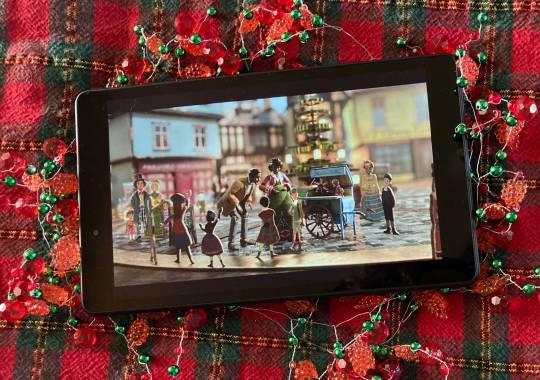
The emotional core of this movie is the relationship between Jeronicus and his granddaughter Journey. Jeronicus is a grumpy, disillusioned inventor who abandoned his aspirations after achieving his dreams lead to nothing but betrayal and heartache. Journey is a bright, talented child who wants to learn from her brilliant grandfather, but she realizes she has to reignite his belief in himself first. The story centers around belief in the impossible, like most Christmas stories, but instead of asking the audience to believe in something like Santa Claus, Jingle Jangle reminds the audience to believe in themselves and their own abilities. Personally, I’ve never felt more inspired than when a small child belted about how “The square root of impossible is me!” The story digs into how depression can destroy a person’s creativity and inspiration and sometimes what we need is other people believing in us so we can be reminded to believe in ourselves.
My whole deal is reviewing fantasy though, so I feel like I should mention magic. Like most things in the movie it is very pretty to look at. When Jeronicus and Journey use their magic it is glittery, dazzling and very obviously a metaphor for imagination and creativity. Personally, these characters could have probably just have been very smart, but having a visual to see them thinking in new and exciting ways was nice. Math-but-its-glowing as a magic system is not something I’ve seen much of recently, but I know just enough math words to delight in what is coming out of these character’s mouths when they talk about their inventions. This might be a difficult movie for haters of math or people who study it for a living. If hearing characters say things like, “Belief! It collapsed the wave function.” and “Take the circumference of spectacular, divided by the second derivative of sensational…” is a deal breaker for you, then maybe skip this movie.
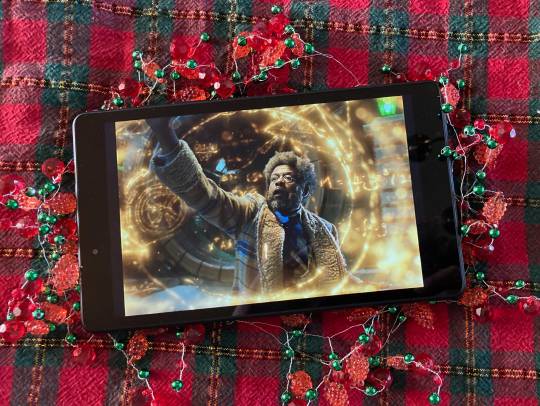
Also, I should note that this movie is a musical. This came as a surprise to us the first time we watched it, but luckily we love musicals. The first time the music swelled and Jeronicus started singing we were swept away by the magic of the moment, delightfully surprised and in awe of the musical talent. Every single song in this movie is energetic, fun and refreshingly Black. Director David E. Talbert said that he was inspired by southern soul and gospel music as well as Afrobeat and other primarily black genres. The mix of inspiration creates joyful and fresh new songs for the holiday season.
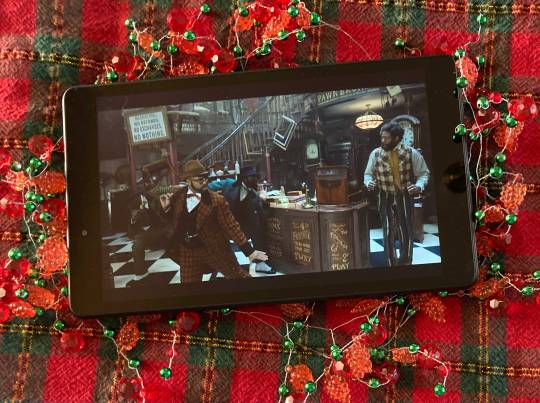
As a whole this movie got my highest rating because the things I love about it outweigh the flaws. That being said, there are a couple pieces of the story that either didn’t make sense or it feels like they did not think all the way through. First of all, the main conflict revolves around the villain Don Juan, a toy matador who has been given sentience through Jeronicus’s miraculous inventions, not wanting to be mass produced. While the story tries to convince us that the conflict revolves around Don Juan’s narcissism, if you think about this plot point too hard you realize that our protagonist plans to mass produce and sell his creations that are clearly alive and intelligent. Obviously the movie doesn’t dig into the ethics of this, since Don Juan is more concerned about not being one-of-a-kind rather than worried that he is going to be bought and sold as a commodity, but it is a concerning angle that implies some very uncomfortable things about this universe.
Another piece that I found falls apart when you think about it too hard is the framing of the story within a story. Jingle Jangle is told a bedtime story being read by a grandmother to her grandchild (similar to the Princess Bride). The first scenes introduce us to a couple of cute kids who ask their grandmother for a Christmas story and in opening the book we get some spectacular CGI and animation to introduce us to Jeronicus’s world. While there is nothing inherently wrong with this method of storytelling, I found it to be unnecessary since the children listening to the story and the grandmother don’t add much as independent characters. Unfortunately, the story seemed to feel the need to justify these characters’ existence and so in a big reveal at the end we discover that the grandmother is Journey, Jeronicus’s granddaughter.
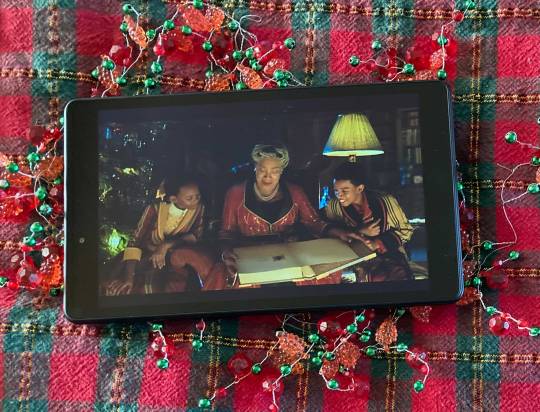
While seeing Journey with her grandchildren is cute, it leads to questions that I personally did not need to have at the end of this otherwise tied up narrative. For example, the children seem to have never heard of Jeronicus Jangle, Don Juan or Buddy 3000 (another important toy character), yet we are meant to believe that Jeronicus’s story happened in the universe that the children live in? Why wouldn’t they know stories about their rich and famous great-great-grandfather? Why had they never heard of Jeronicus Jangle when it is implied that the toys they have grown up with would have been his or his family’s inventions? By making the children related to the people in the story, the writers distracted me from Jeronicus and Journey whose story is much more interesting and heartwarming. Jingle Jangle is a movie that asks me to think and reflect, so I don’t feel bad poking holes in the story, but I don’t love that they left me hanging with all these questions.
Additionally, there are also some things that I wish the writers hadn’t included in the movie at all. For example, they fridged Jeronicus’s wife almost immediately which was completely unnecessary and I hated to see that in a movie that got so many other things right. Also, having the only obviously Hispanic character (Don Juan Diego) be the villain in such a cartoon-y way left a bad taste in my mouth.
But Jingle Jangle still got my highest rating because as the sum of its parts, it was a fantastic story and I am so glad I got the chance to watch it. My very favorite part of this movie that has stuck with me even weeks after my first viewing is the relationship between Jeronicus and his family. There are sections of this movie where Jeronicus falls into the stereotypical absentee black father trope, but this story allows his character space to talk about what he did wrong, how he is hurting and Jeronicus learns to do better which is so important. I love the current trend in movies where parents apologize to their children because that can be such a healing experience and Jingle Jangle gives us that, but additionally, it makes the parent work for it and prove to their child that they are healing themselves. It offers hope to children struggling through painful situations like this and give parents an example of how they might be able to fix what they broke.
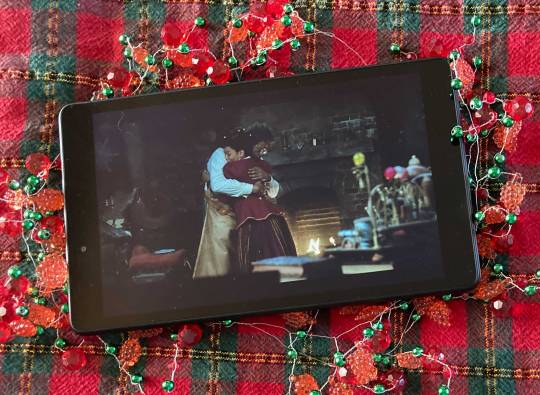
Overall, Jingle Jangle left me with a feeling of joy and contentment while inspiring me to remember what I used to love and rethink my self-imposed limits. The core message of this movie is a reminder that sometimes our lack of belief in our own skills is enough to stop us from achieving our dreams. Jingle Jangle reminds us to believe in our own capacity and lift each other up even when times are difficult. I don’t know if this movie will become a classic in the general consciousness, but it will certainly become a tradition in my family.
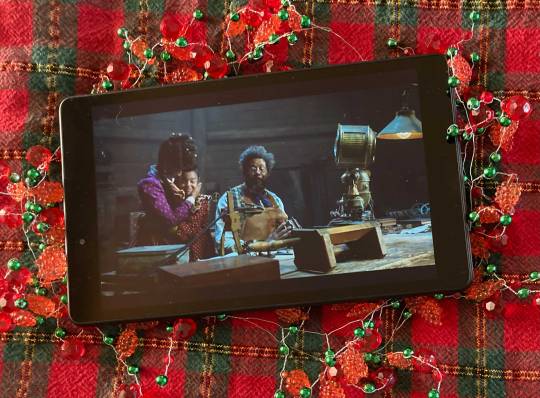
~TideMod
#Jingle Jangle#jingle jangle: a christmas journey#David E. Talbert#movie review#reviewblr#musical#children's movie#christmas movie#fantasy#wholesome#black protagonists#black director#netflix orignal movie#long post#spoilers#jingle jangle spoilers#review#photos#TideMod#diverse cast#diverse fantasy#movie recommendation
7 notes
·
View notes
Text
Loki: How Sylvie’s Decision Could Reshape the MCU
https://ift.tt/eA8V8J
This article contains Loki spoilers.
Marvel’s Loki is many things at various points over the course of its six-episode run: A Philosophy 101 debate about determinism, a rumination on the existence of free will, a Doctor Who-style meditation on the interconnected messiness of time, a buddy cop romp through all of known reality, and the most bizarre love story that Marvel has yet told on screen.
Tom Hiddleston remains as charming as ever as Loki, playing an earlier version of the God of Mischief with much of the pathos that ultimately made his original take on the character so compelling to watch. Plus, thanks to the introduction of Variants – different versions of familiar characters whose lives have diverged from their predetermined timeline in some way – he got to act opposite a CGI alligator version of himself.
But it’s the introduction of the female Loki variant Sylvie that has not only rewritten our understanding of Loki as a character but who has also essentially charted a new course for the entire Marvel Cinematic Universe. Her decision to kill He Who Remains (or Immortus or Kang the Conqueror or however you want to refer to the being who lives in the castle at the end of time) is crucial to setting up the world of the MCU post-Thanos, but it also establishes a new role for herself within it – and for Loki as well.
What Makes a Loki a Loki?
Much of Loki has been about our titular former villain’s transformation into something like a hero, and his final confrontation with He Who Remains underlines the multiple dramatic ways in which he has changed thanks to his relationships with both Sylvie and Mobius. In the face-off that ultimately decides the literal future of reality, Loki insists he no longer wants to rule the way he once did, that he is capable of putting his ambition and anger aside for the greater good.
Loki’s goals are much smaller and more intimate now: Not galactic conquest or domination, but stability and a life with the woman he loves (his assertion that he actually doesn’t want to rule, just make sure Sylvie’s okay is a massive perspective shift for a man who’s only ever otherwise cared about himself). We’ve seen how Loki’s growing feelings for Sylvie have impacted him as a character, with his complicated appreciation for her helping him to understand and, to some extent, combat his own rampant feelings of inadequacy and insecurity.
Gone is the rebel who wanted to overthrow the Time Variance Authority as soon as he arrived within its halls. And in its place is a man who understands that while the TVA is a despicable organization, it may very well be a necessary one – if only because the alternative is likely a great deal worse.
Instead, it is Sylvie who steps forward to fill the void Loki’s embrace of a more traditional hero’s arc has left behind, a new Queen of Chaos who ultimately chooses freedom, free will, and, yes, mischief, over the rigid rules of a world whose order is predetermined. Her betrayal of Loki stings emotionally, of course; Loki has done a remarkable job making their connection feel less bizarre and off-putting than it has any right to be. But it is also a perfectly in-character choice for her. Sylvie is who she has always said she was, the product of a universe that craves chaos, a variant who was essentially created to do exactly as she does here.
What makes a Loki a Loki? In short: This.
For better or worse, Sylvie remains irrevocably tied to the identity she forged before Loki ever existed, a lost girl seeking revenge for the destruction of a life she never got to live. What she’ll do now that she’s achieved her goal, how she’ll live without the animating force that’s single-mindedly driven her since she was just a child, is unclear and remains a major unknown heading into the show’s just-confirmed second season.
Obviously, Sylvie’s decision to kill He Who Remains will have far-reaching consequences for everyone else in the universe (or multiverse, as it stands now). Her actions have freed reality from the concept of a Sacred Timeline, allowing seemingly infinite numbers of Variants and alternate branches of existence to flourish in a way that they haven’t since the TVA was first created.
She has literally changed the face of reality itself, restoring free will to billions of people and finally achieving the revenge she’s spent the bulk of her life seeking. This is no small feat, but it does beg the question of what could possibly come next for her as a character.
What’s Next for Sylvie in Loki Season 2?
Perhaps Season 2 of Loki will serve as Sylvie’s emotional crucible, a story in which she’ll have to wrestle with many of the same introspective sorts of questions that Loki did in its first (for example, I’m still waiting to find out precisely what her Nexus Event was, as well as how she came to change her name so drastically). It seems likely that she’ll come to regret the decision she made beyond the Void or at least realize that the chaos she has unleashed upon reality has caused more harm than good.
This would put a new twist on Loki’s traditional failed ambition and painful comeuppance narrative cycle, in much the same way that Loki has consistently seemed to view Sylvie’s journey as a parallel to his story rather than a direct copy of it.
Viewed in that light, what does it mean that Sylvie chose vengeance for herself and freedom for others rather than a future with Loki? And what does her decision mean for their obvious emotional connection: Is their love more or less real because Sylvie didn’t prioritize it? Was the kiss that finishes off their climactic swordfight a genuine expression of care? Pure manipulation? Somewhere in between?
Or will Sylvie simply emerge as Phase 4’s “new” Loki, a Goddess of Mischief who takes up the mantle of untrustworthy trickster and troublemaker just as Loki himself embraces his new heroic mission to try and fix the timeline his other half broke?
cnx.cmd.push(function() { cnx({ playerId: "106e33c0-3911-473c-b599-b1426db57530", }).render("0270c398a82f44f49c23c16122516796"); });
Perhaps Loki Season 2 will do what its protagonists could not, and chart a new, third path through the existing binary of bad and worse options. But whatever happens next – either on this show or in the Marvel feature films that follow – it’s all only happening because of Sylvie. No matter what her future holds, at least for this moment she’s the most important person in any and every reality.
The post Loki: How Sylvie’s Decision Could Reshape the MCU appeared first on Den of Geek.
from Den of Geek https://ift.tt/3hJCS8c
1 note
·
View note